The W and O treks are undoubtedly popular ways to experience Torres del Paine National Park, but they are not the only options. As the number of tourists on these trails continues to rise, I’m thrilled to introduce you to a new way to explore the park. With the advent of e-bikes, you can now traverse the park and its surroundings with ease. In this article, I’ll share why e-biking at Torres del Paine National Park is a fantastic alternative to hiking, based on my own experience.
I hiked the W circuit over a decade ago, and even then, it was so popular that all the lodging and camping spots were reserved far in advance. Suppose you are looking for a way to escape the crowds and discover how people typically experience Torres Del Paine. In that case, I have a solution for you. Ebiking from estancia to estancia in Torres Del Paine.
When my friend and Chile Nativo owner Gonzalo approached me about his innovative e-bike tour around Torres Del Paine National Park, I was immediately intrigued. In all my years in the travel industry, I had never come across the idea of biking around the park—only hiking. This culturally immersive e-bike adventure tour offers a unique perspective on the park, and I was eager to delve deeper into this exciting new way to experience Patagonia.
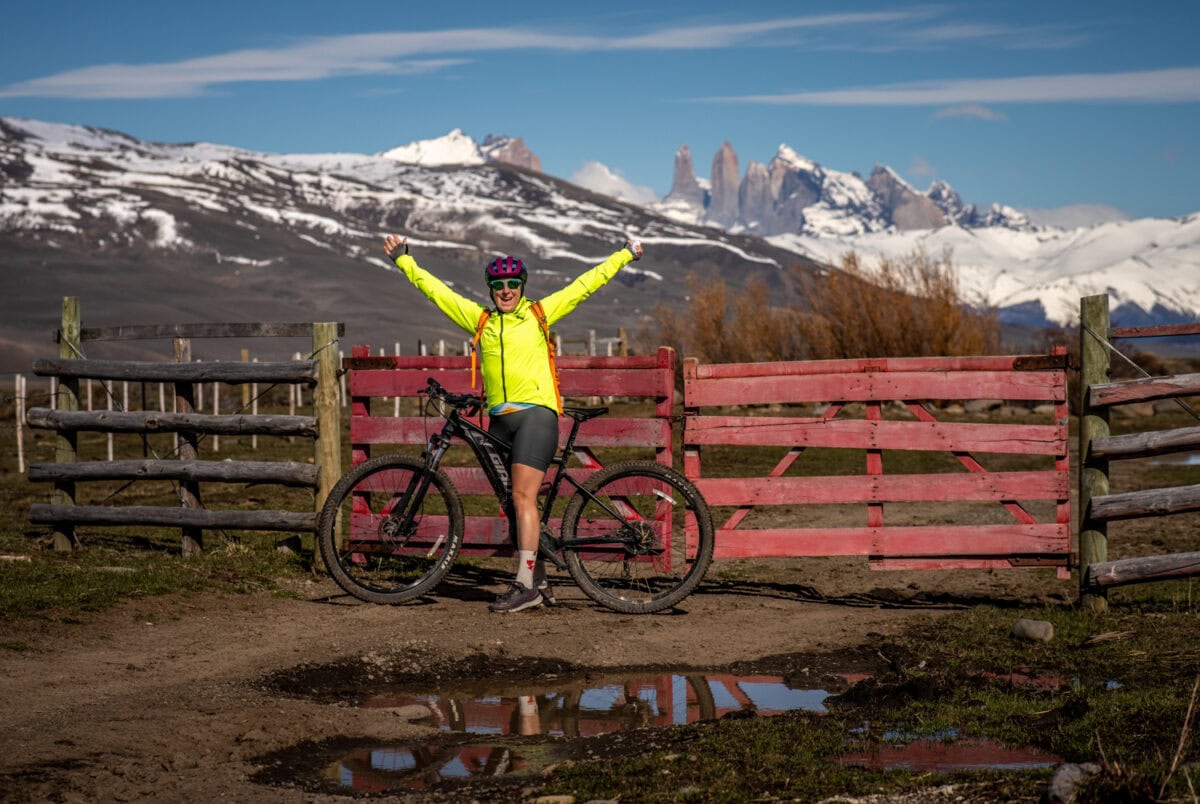


Get off the beaten track in Torres Del Paine Patagonia
I wouldn’t say Patagonia is overtouristed. However, it is a very popular travel destination, and for a good reason – it’s utterly jaw-droppingly stunning. However, when you start researching Torres Del Paine National Park, you’ll find that the main activity is hiking the famous W or O trek around the park. However, more and more, you hear of the crowded campgrounds and refugios, the over-hiked trails, and the number of people at viewpoints.
There is no permit system in place yet for these hikes, but according to locals in the tourism industry, it’s not far off. Currently, campsite/lodging availability regulates the numbers on these hikes, but they will need to do more than that in the future if they want to preserve the trails and the experience.
This is why I’ve been looking for alternatives to the W or O Trek to experience the park.
I know – it’s easy for me to say skip the crowds and do something else since I luckily already did the hike myself years ago. But my goal with this website has always been to get people off the beaten track and introduce them to new, lesser-known places where they can have an even better, more transformational experience than the typical bucket list destinations.
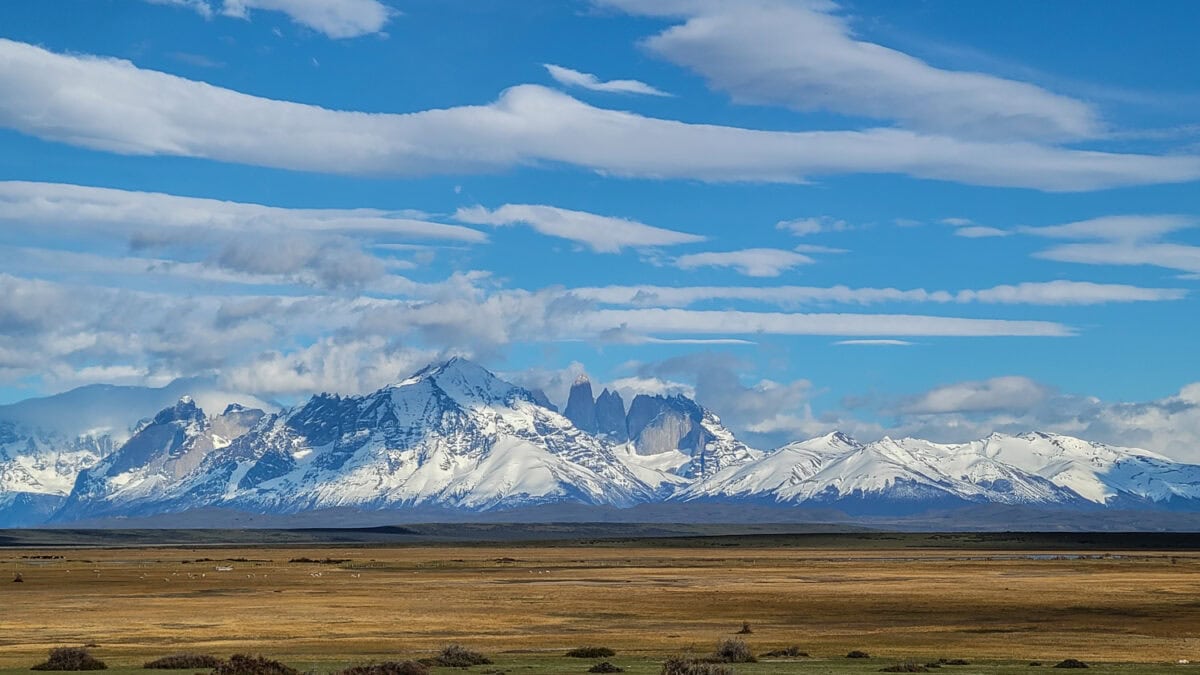



The hikes are a great way to get close to the famous torres (towers) – the three granite peaks of the Paine mountain that reach 8200 ft. However, the torres are just as impressive from a distance (IMO they are MORE impressive from a distance). When you see them rise up like needles from the flat expanse of pampas (grasslands) that surround the park along with the entire Paine mountain range – it’s epic. The W trek doesn’t give you those views.
However, an ebiking tour would do just that!
A Different Way to Experience Torres Del Paine National Park
A small group of us set off on one of my favorite kinds of trips—a journey. I’ve always considered journeys to be a special kind of travel.
One in which you pass from place to place with an ultimate destination goal at the end. It’s more than a vacation – it’s a passage of grand proportions where each day gets you closer to your goal. You learn from the places you see and the people you meet. Sometimes, you don’t know if you’ll make it to the goal – which makes it even sweeter when you arrive at the end of the journey.
I love this type of travel – it’s why I did the Camino de Santiago, the Mongol Rally, and why I do my Capitol to Capitol bike rides – for the journey.
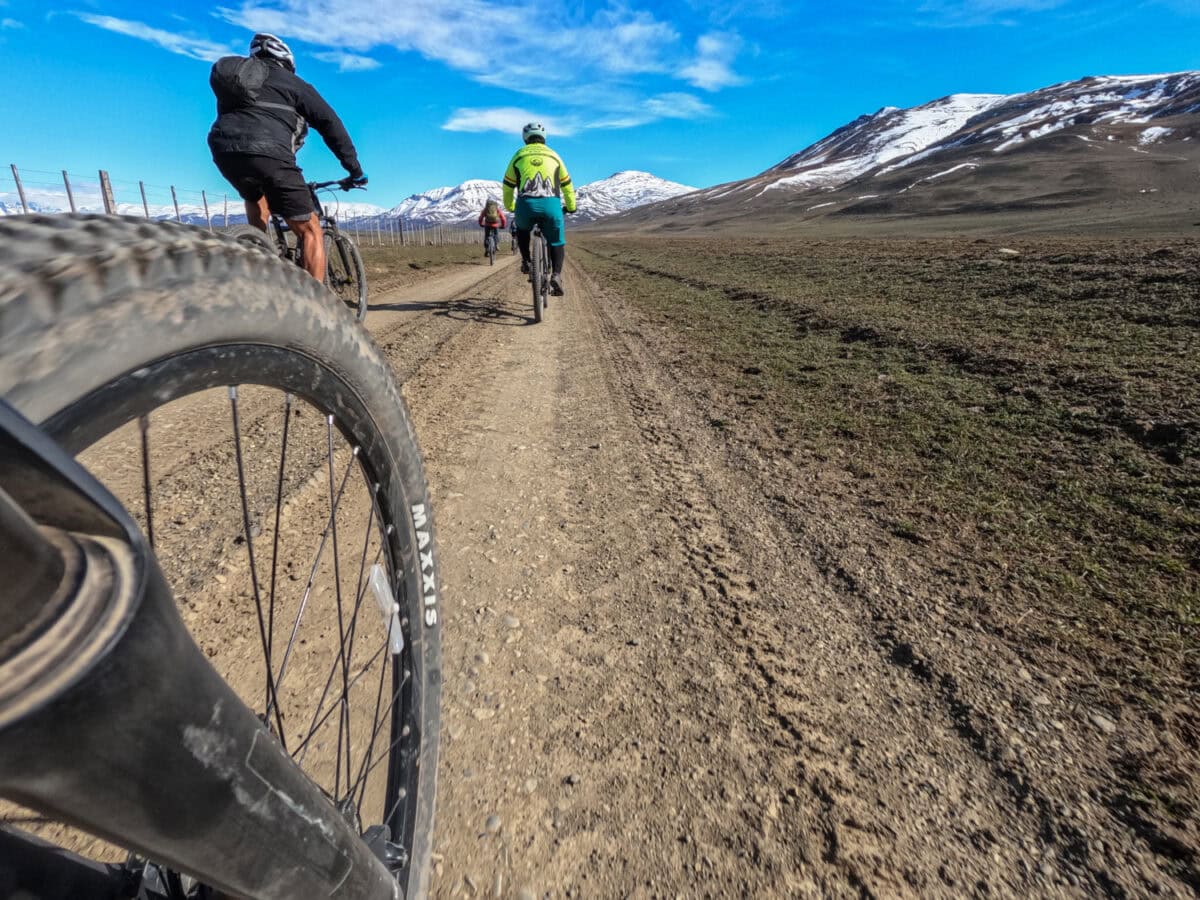



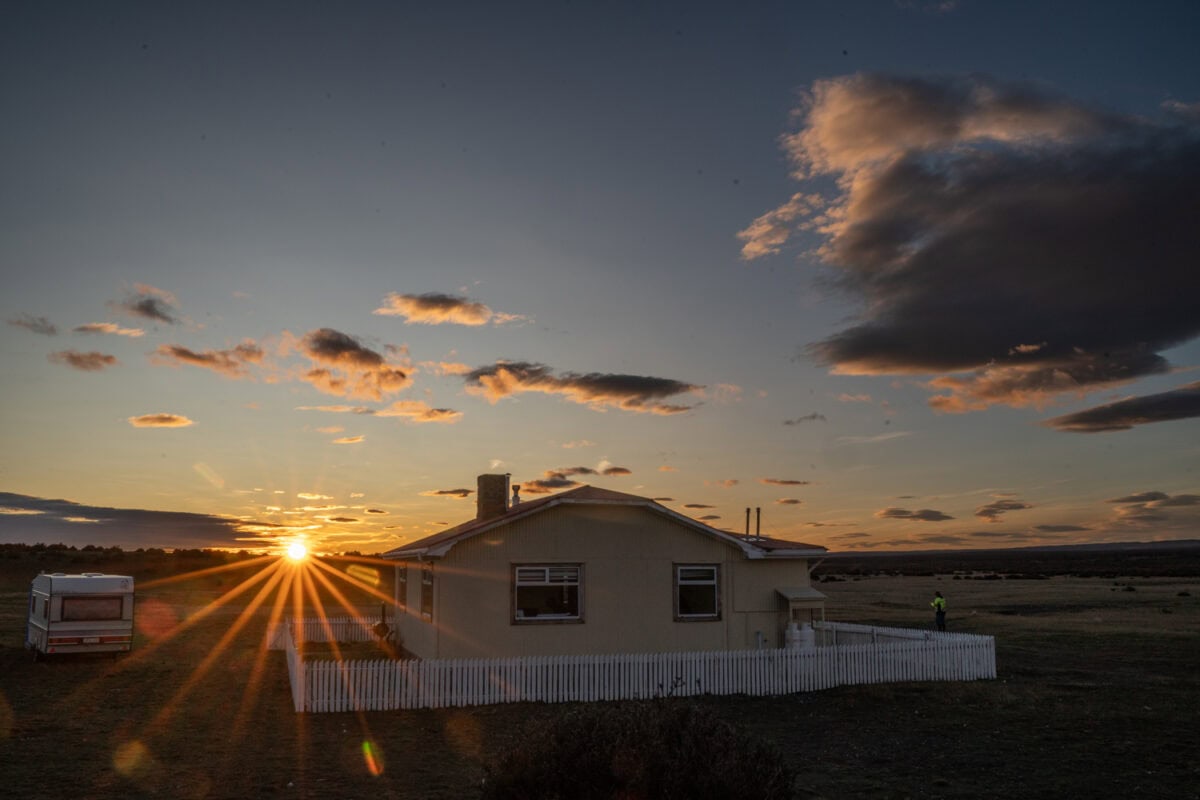



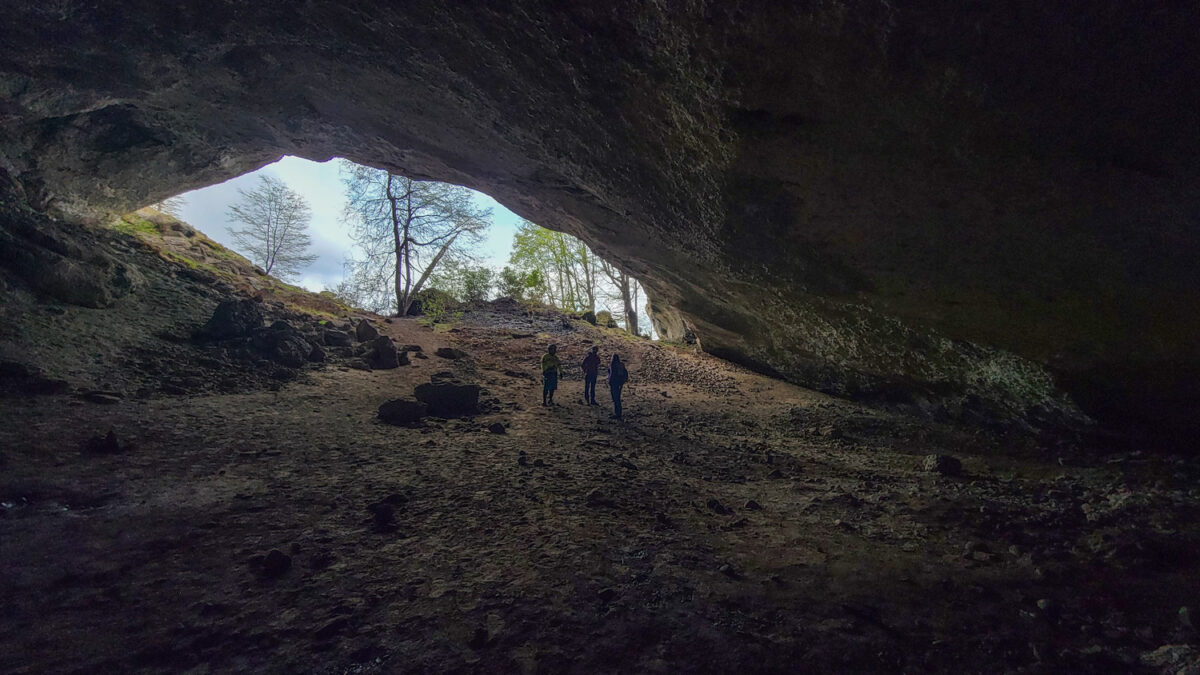



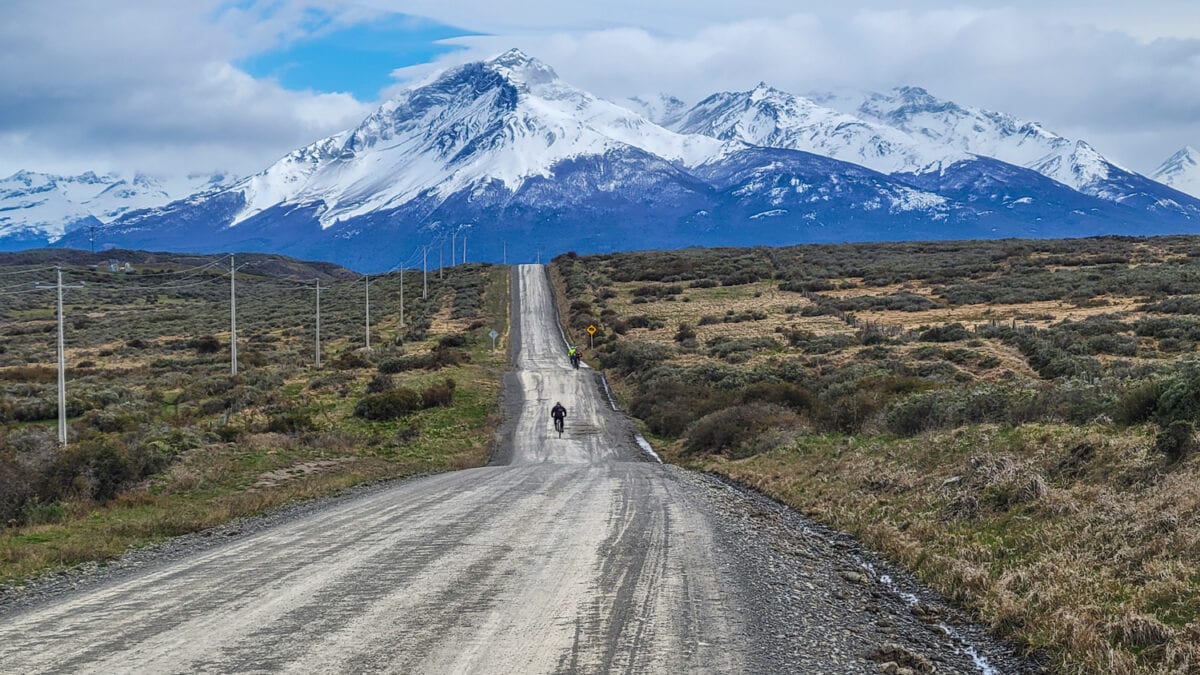



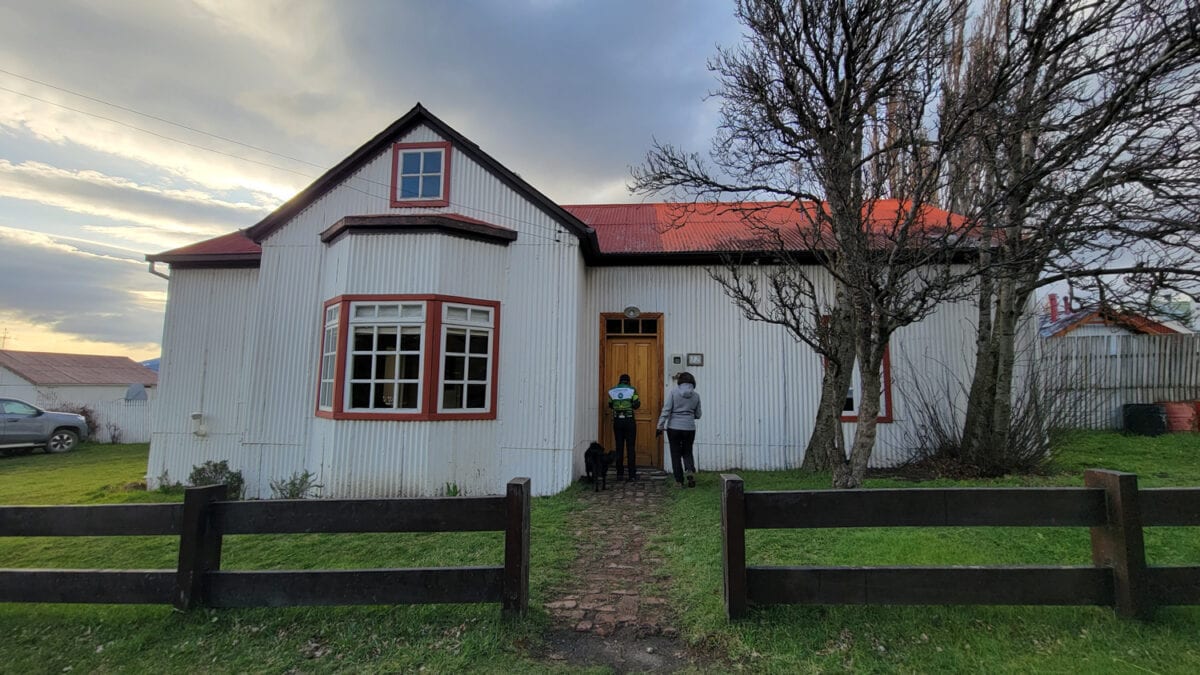



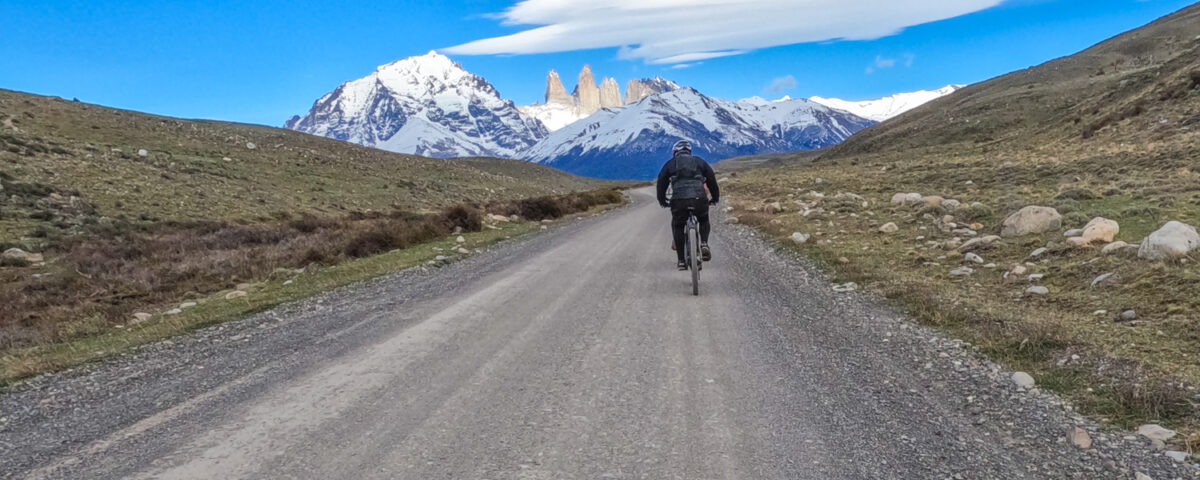



On this trip, we embarked on a unique journey from Estancia to Estancia by e-bike, each day getting closer and closer to the park while immersing ourselves in the rich culture of gauchos and family businesses. Each day, we biked past herds of wild animals, and we’d be stopped by them crossing over our path as if it were the African migration! One of my favorite things about this journey is that we could always see our goal, the torres in the park. In the evenings, we enjoyed the unique estancias, met the owners, and savored the most beautiful and complex food cooked over an open flame.
Patagonia Estancia History and Culture
An estancia is a large ranch normally located in the pampas (grasslands) surrounding the park. One of the things that makes the park so awe-inspiring is the fact that the mountain range rises 8,000 feet out of the flat pampas, making it look even more majestic.
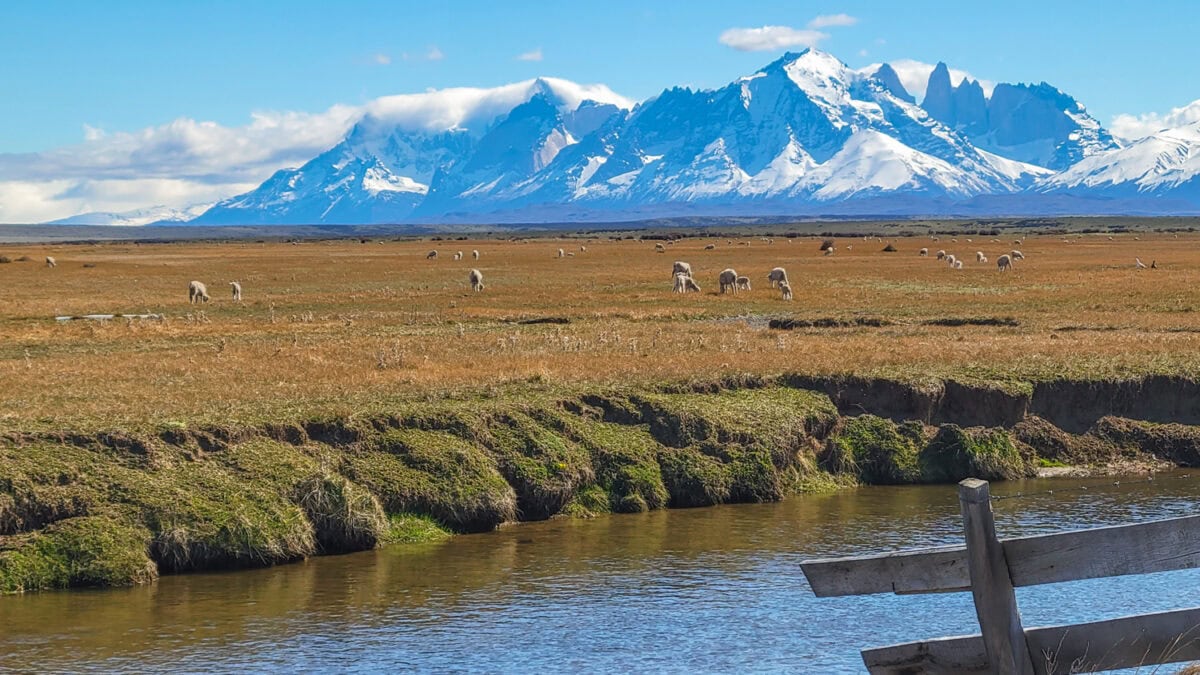



In the 1800s, immigrants from European countries moved to Patagonia to take advantage of the grassy pampas as fields to raise large herds of sheep and cattle and cash in on the global demand for wool – white gold. The rugged land was perfect for raising livestock – it was about the only thing the harsh landscape was suitable for.
Estancias are large operations run by families and supported by ranch-hands – also known as gauchos. The gauchos are the heart of the estancias and land. They foster a connection to and respect for the landscape, close friendships, and learn to appreciate a slower, more isolated life. Being a gaucho is a true calling.
These estancias are often located great distances from each other, so the bonds between those who live and work at each ranch are strong and lasting. From the dogs to the sheep to the horses to the cows, the animals on the estancias form a symbiotic relationship—all exist together peacefully, each in its own tribe.
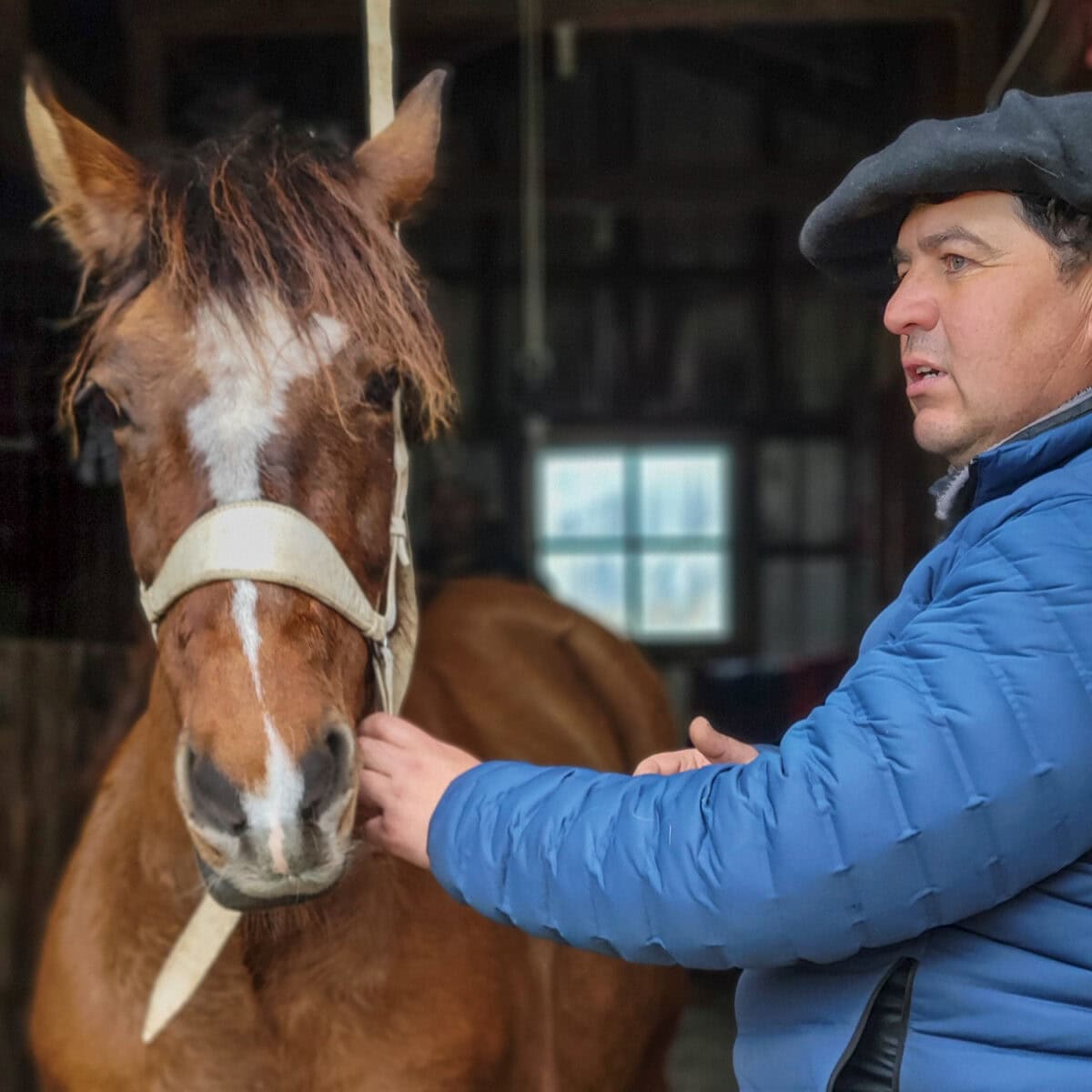



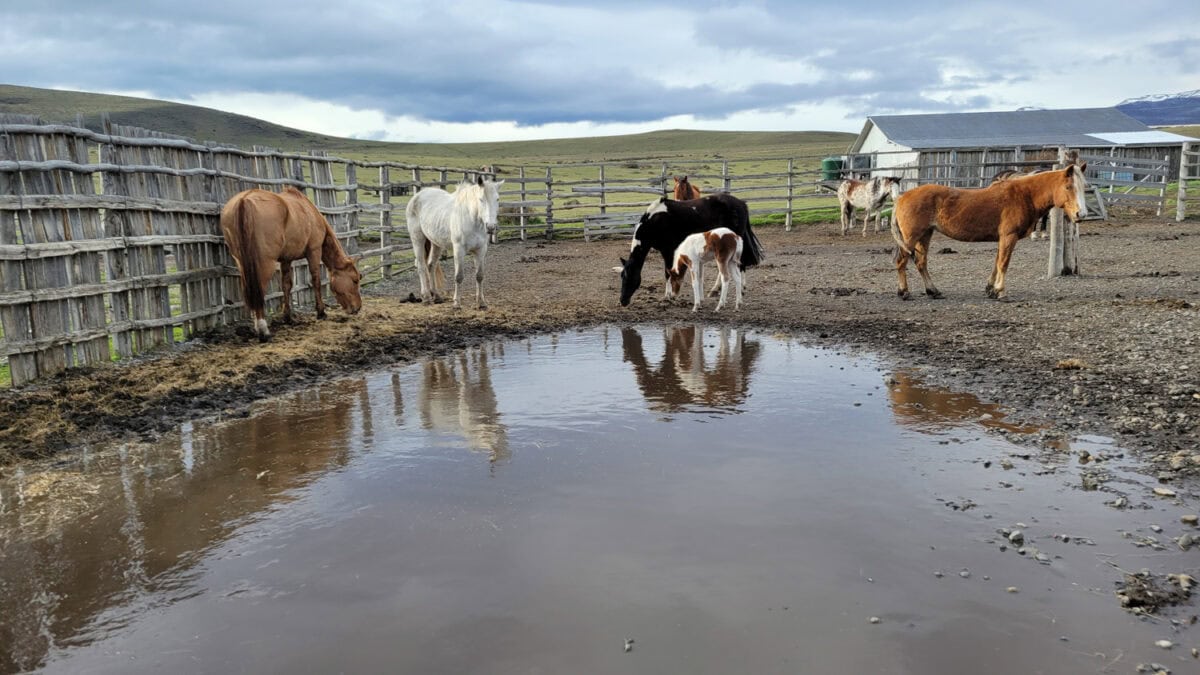



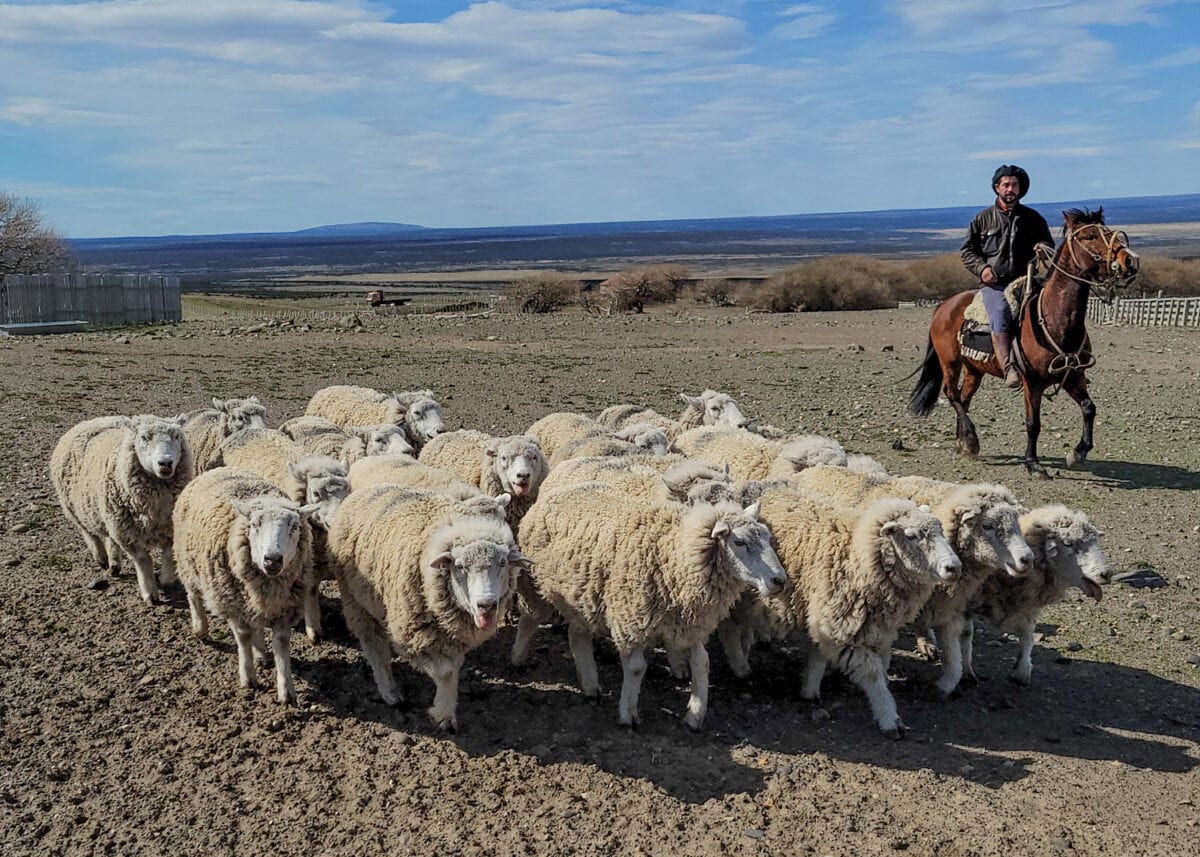



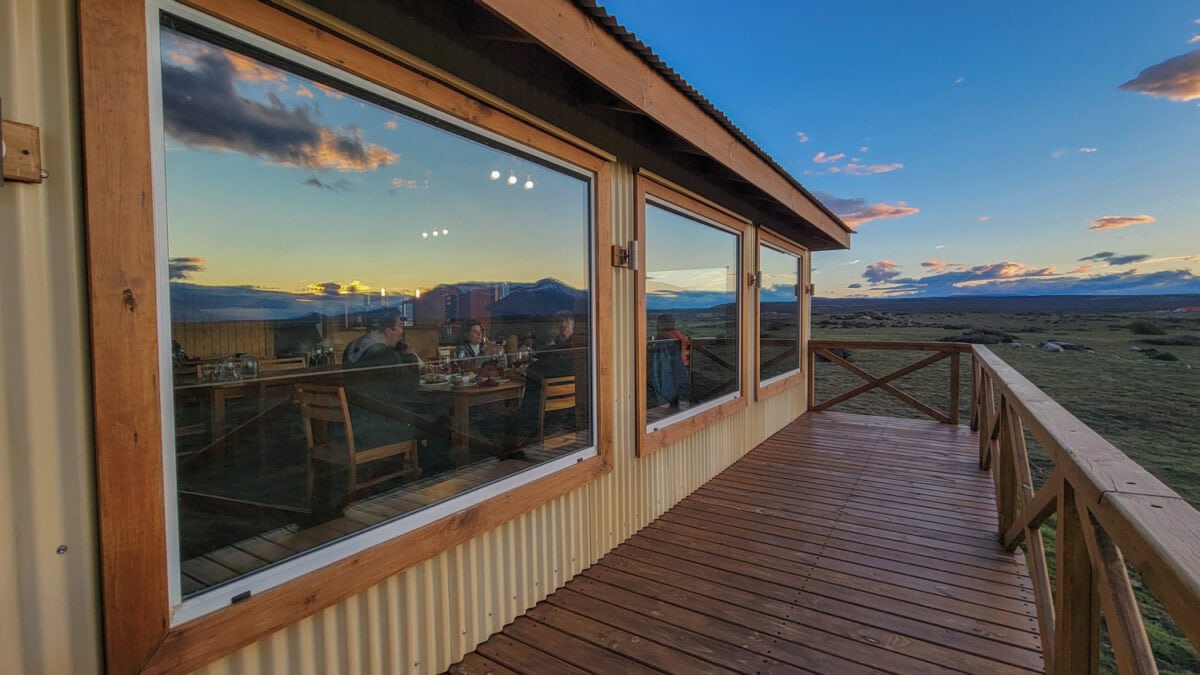



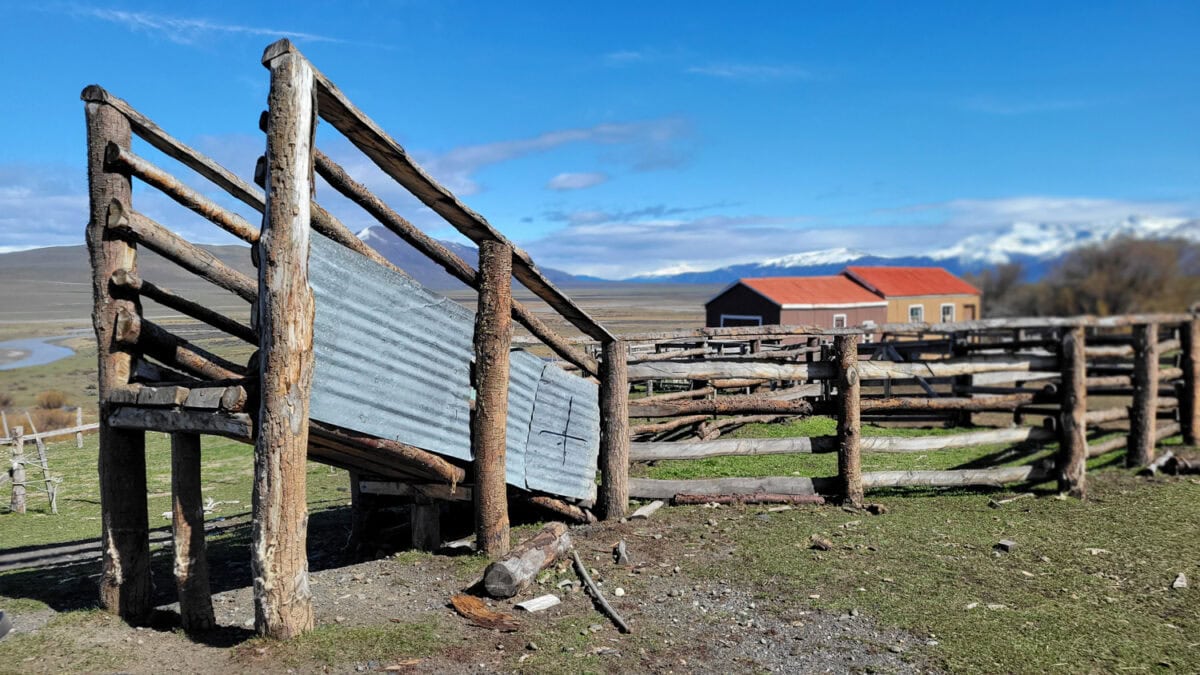



As raising livestock has become less lucrative, these historic estancias have recently started to turn to tourism to help support their existence. New lodge facilities have been built to accommodate horse-riding tourists, and old employee lodging has been revamped into lodging for tourists. Most of the ranches are still run by the families that started them, making it even more fascinating for visitors like me to learn about the changes through history.
This was the one thing that I always thought was lacking when I previously hiked the W in Torres del Paine – the exposure to culture. By journeying from estancia to estancia by bike – I was able to really learn about the culture more comprehensively.
What to Expect biking around Torres Del Paine Patagonia
We biked nearly 130 miles from Puerto Natales through the pampas, into the Sierra Baguales mountain range, and then into Torres Del Paine National Park.
Typically known for its powerful winds, this part of Patagonia has been inaccessible to biking for most people. However, with the rise of e-bikes, you can have the power when you need it. Whether you use the power to cut through the wind effortlessly or up some of the larger hills, it takes away the ‘suffering’ and allows you to really enjoy exploring the region.
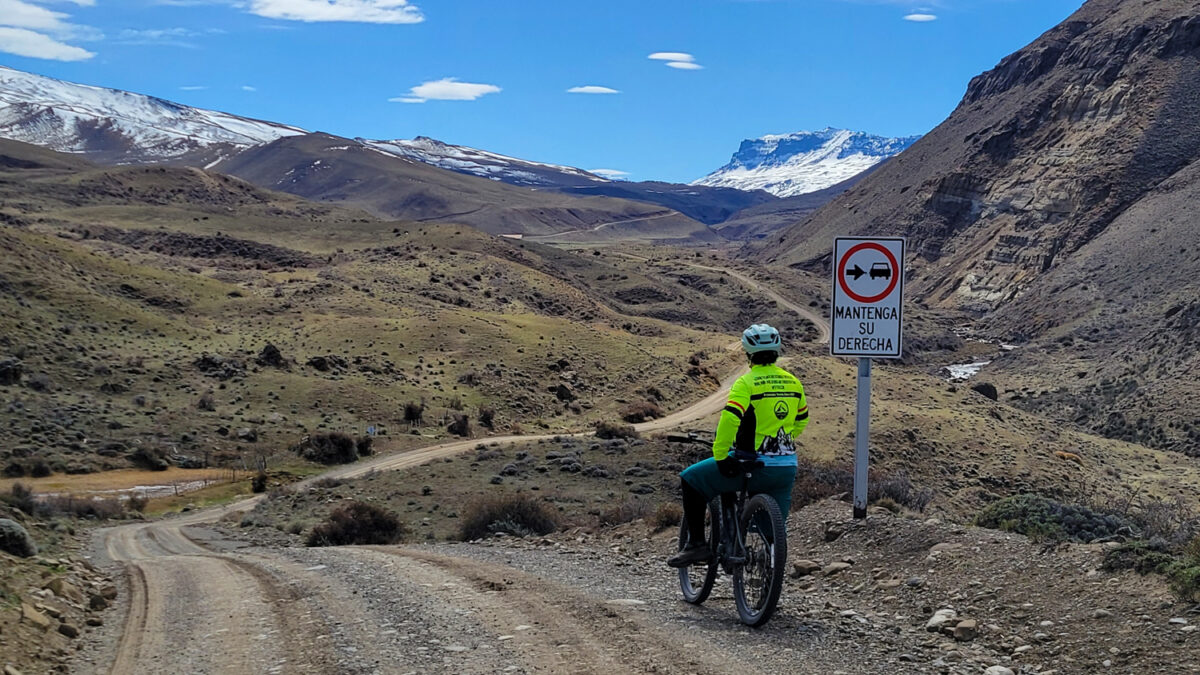



E-bikes in Patagonia
We used new Giant Talon Ebikes. These full-suspension electric mountain bikes help boost your performance on challenging terrain. Plus, they had big, burly tires to handle the gravel roads and pampas.
I was thrilled with the quality of the bike and the battery life. Not once did I run out of battery or feel like I had to conserve it. Plus, the guides took care of all of the charging and maintenance, so you can just enjoy the trip.
If you are new to e-biking, the first thing to know is you still have to pedal! You pedal and shift gears like normal, and when the bike feels you struggling, it will assist you with additional power. The bike does this by detecting your pedaling cadence and force. The level of assistance is determined by which support mode you put it in: Power, Sport, Active, Basic, Eco. This way, you can decide how much exercise you get with an E-bike.
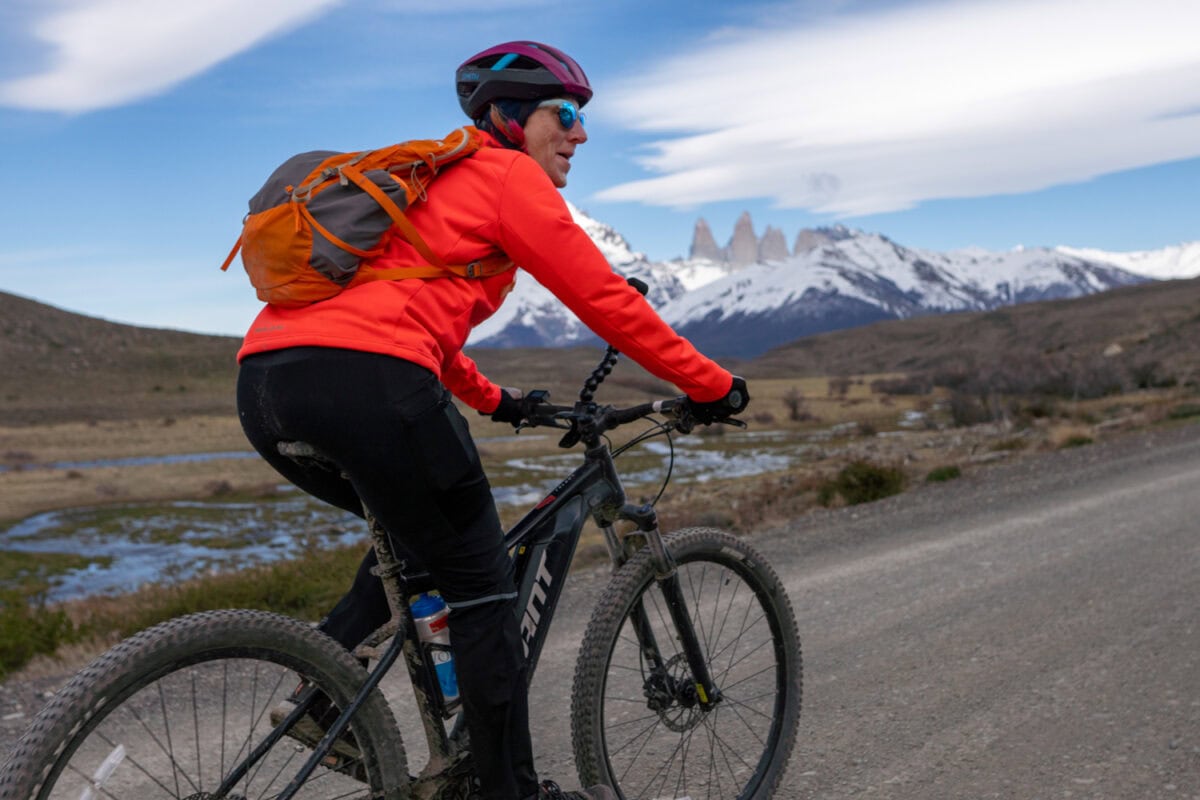



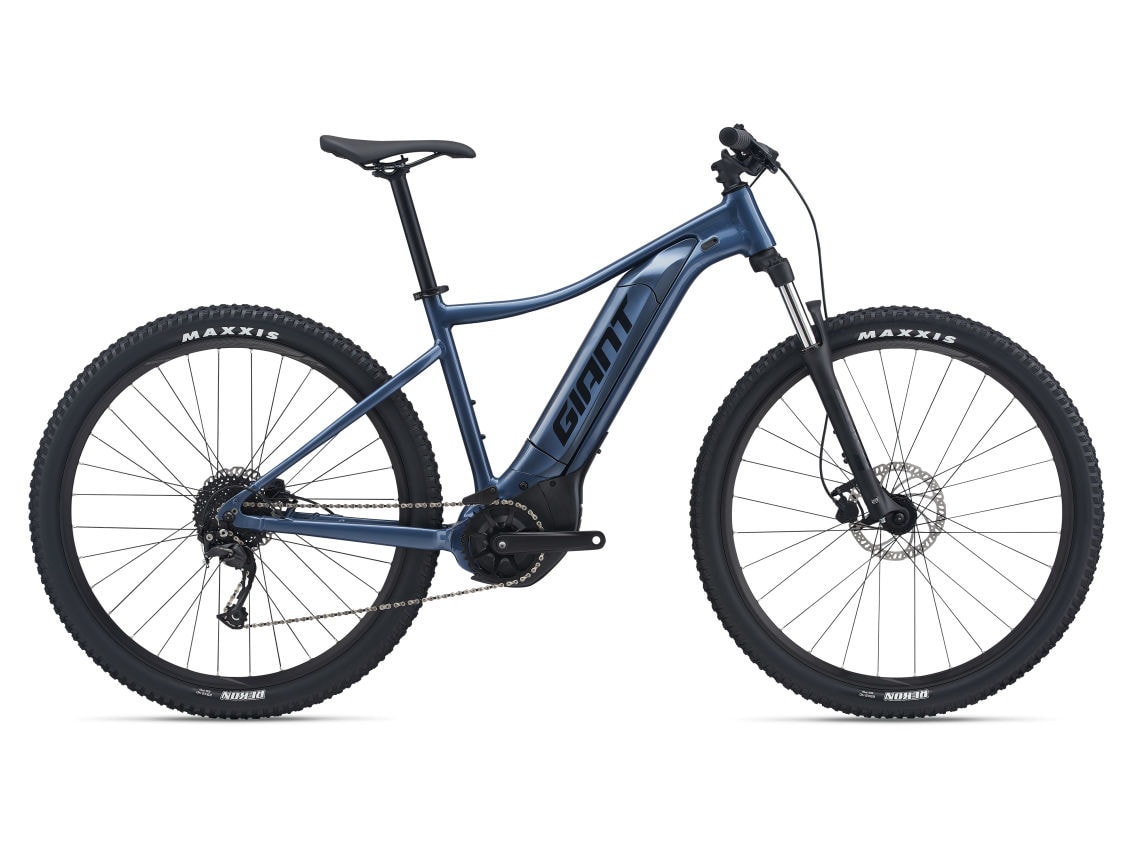



One of the hardest things for beginners riding an e-bike is to be aware of how heavy an e-bike can be.
However, I found these bikes to be surprisingly light and maneuverable. The technology and design of e-bikes improve every year—and these were top-of-the-line!
Estancia Lodging
We stayed in some beautiful estancias along the route. They varied from small operations with just horses to larger ranches with sheep, horses, and cattle. Some of the larger ones had their own quinchos – a covered area with a built-in grill for cooking asado (BBQ) and a large table for serving your asado to your friends and family. For others, we had our private chef cook for us. Remember – these aren’t typical hotels – they are working farms – they didn’t have restaurants.
Because we were staying in authentic, working estancias, the lodging sometimes included bunk beds and shared bathrooms. This didn’t bother me since our group had such excellent comradery. It just made the whole experience better, in my opinion.
Estancia San Luis
The family, Cárdenas-Oyarzún, has been dedicated to livestock farming for more than 45 years. It was a treat to meet the father and his adult children, who are all involved in the business. The estancia’s fence line on the west indicates the border between Argentina and Chile!
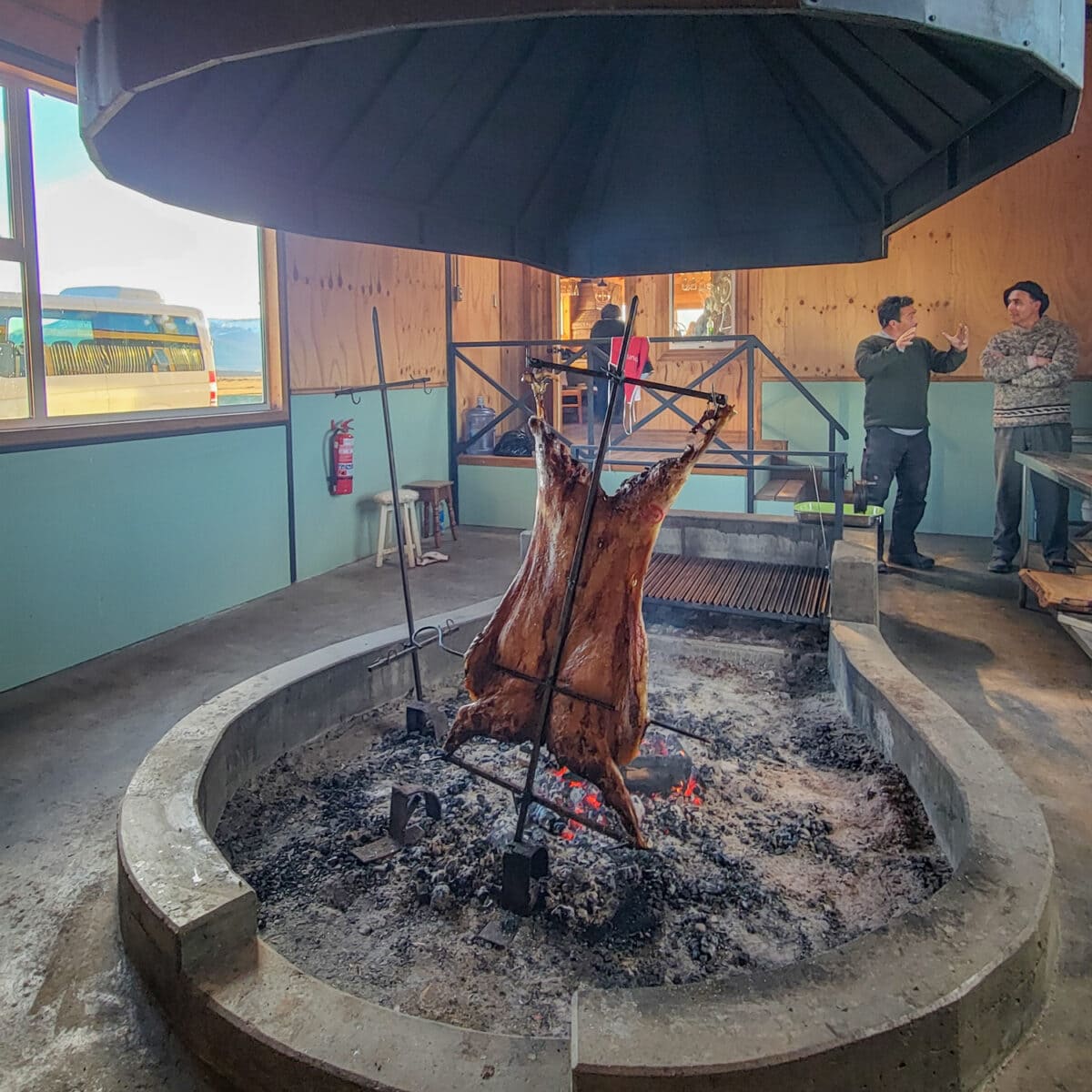



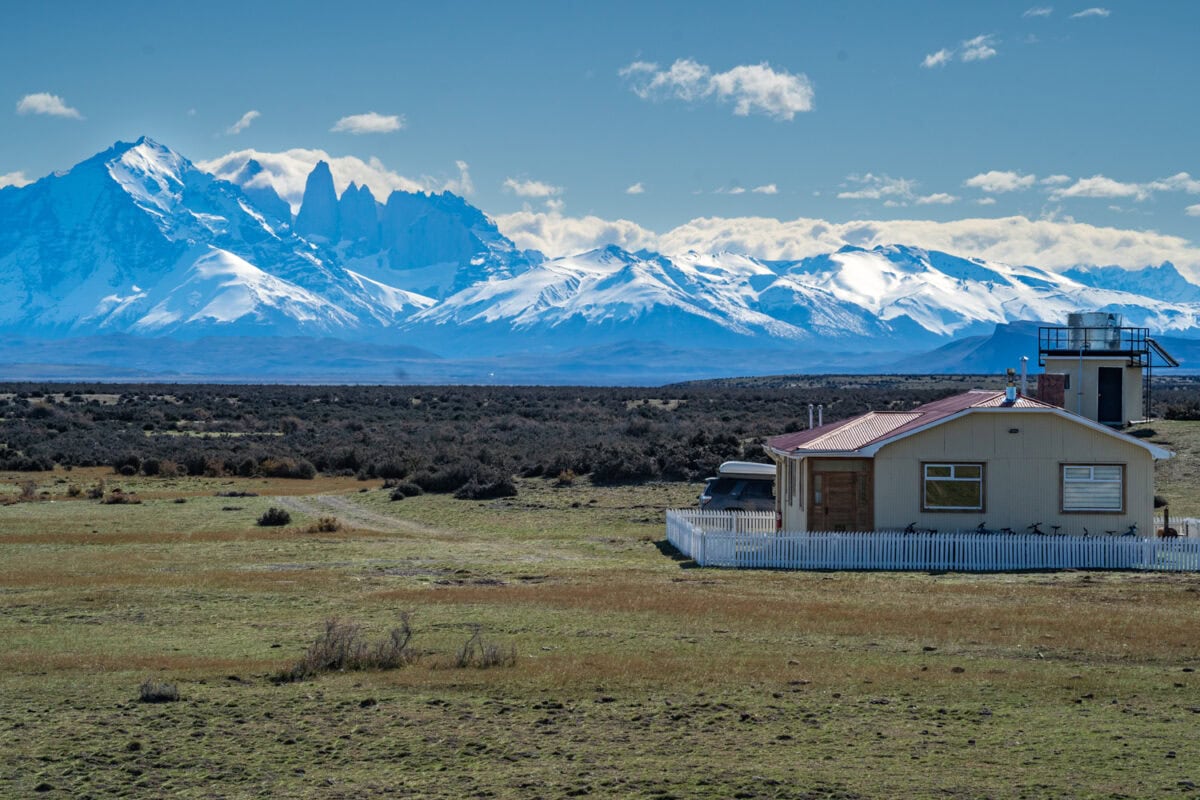



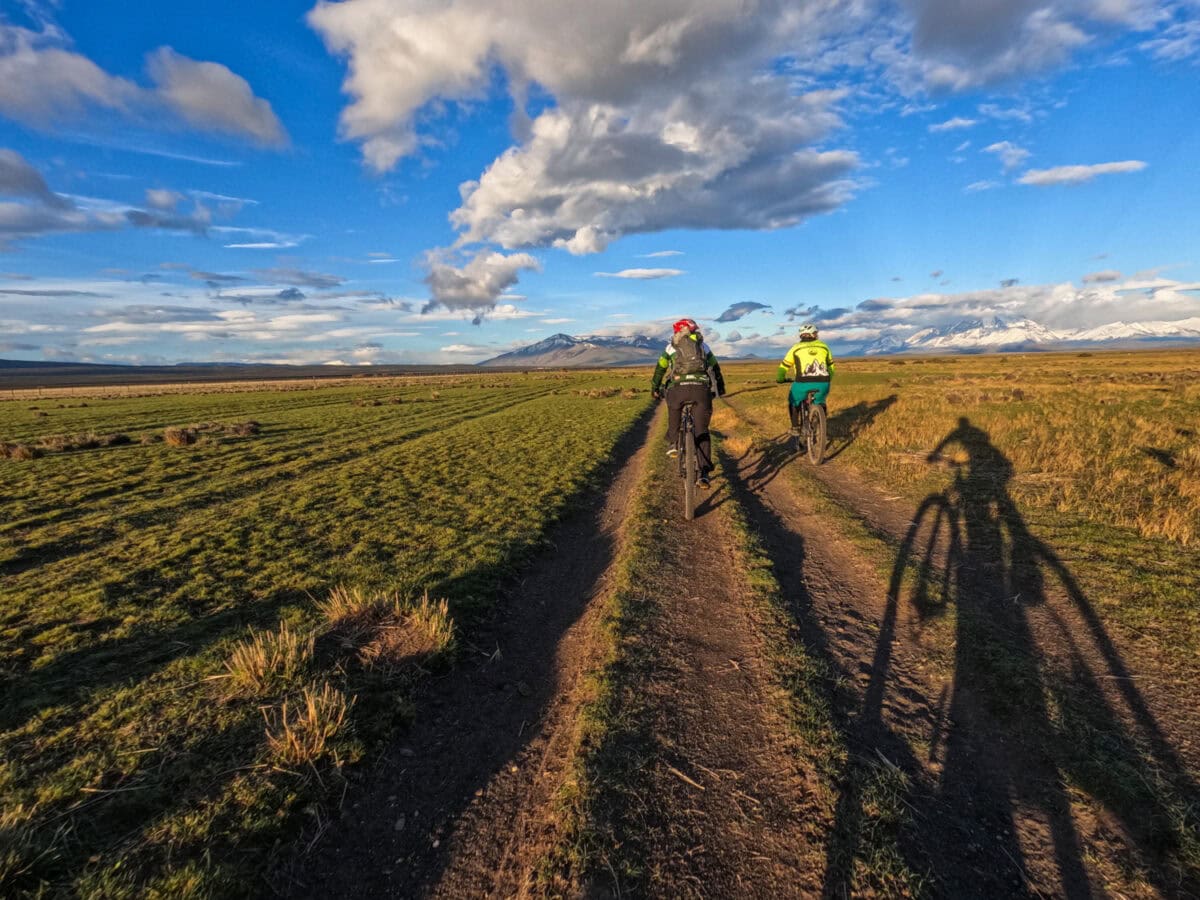



Riding across their property was one of my highlights. Herds of horses ran wild along with us, and big rhea birds ran across our path, bringing us to a halt as we watched in awe. The sun was setting as we rode along the tire-tracked paths through the pampas.
It was beautiful and wild and was one of the most memorable days I’ve ever traveled.
One of the most time-honored (and delicious) traditions on the estancia is that of the authentic Patagonian asado or barbecue. A lamb is butterflied over a low-burned fire for several hours, cooking the meat to tender, juicy perfection before being chopped up and served with sides and plenty of Chilean wine. The family had a beautiful quincho, and they had a special asado for us. We feasted on lamb while the sun went down behind the torres in the distance – a magical way to end the day.
Estancia 3R
Tucked away among the stunning Sierra Baguales mountains lies Estancia 3R. The route there was hilly – but wasn’t a problem with the ebikes.
The estancia was located literally at the end of the road, where the landscape became even more wild and untamed – just like the horses she kept on the property. The owner sat and ate dinner with us, and she told us about the family history of the ranch being handed down through generations. She had decided long ago that she wouldn’t sell out to big companies, she wanted to keep the land free and wild.
It was touching how much she loved and wanted to fiercely protect the region.
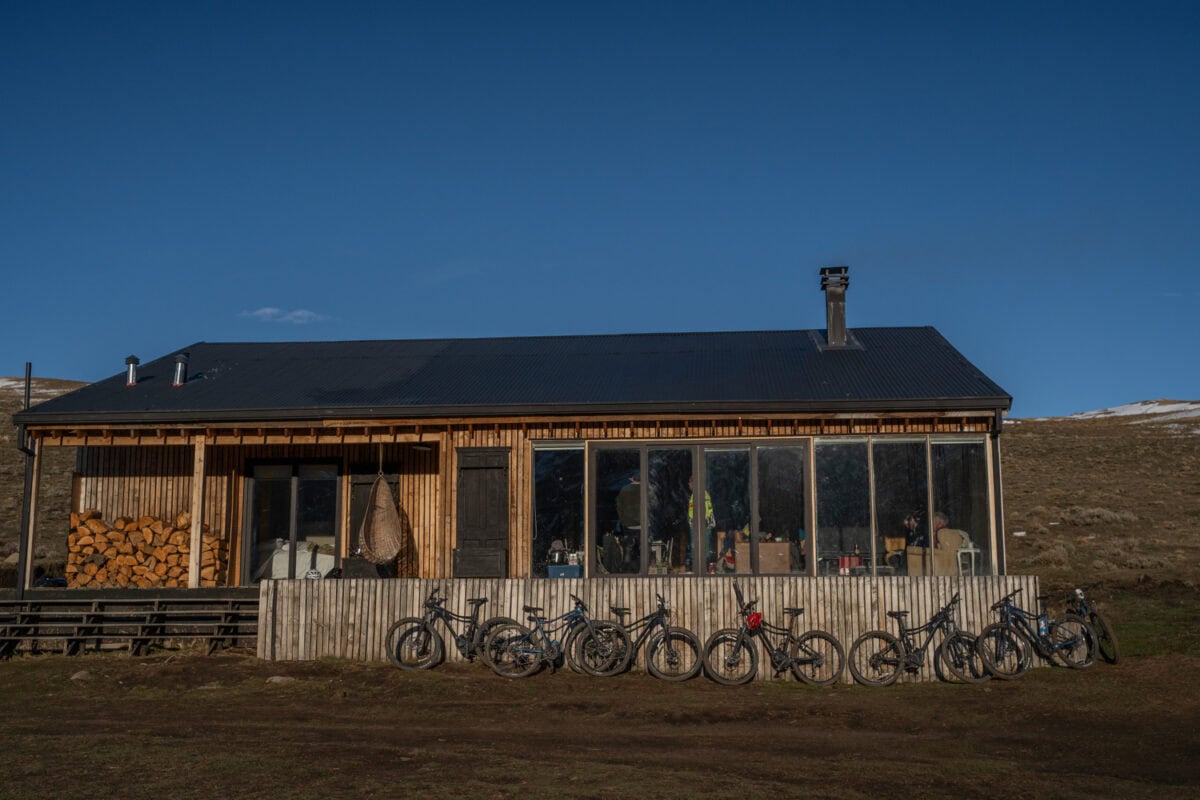



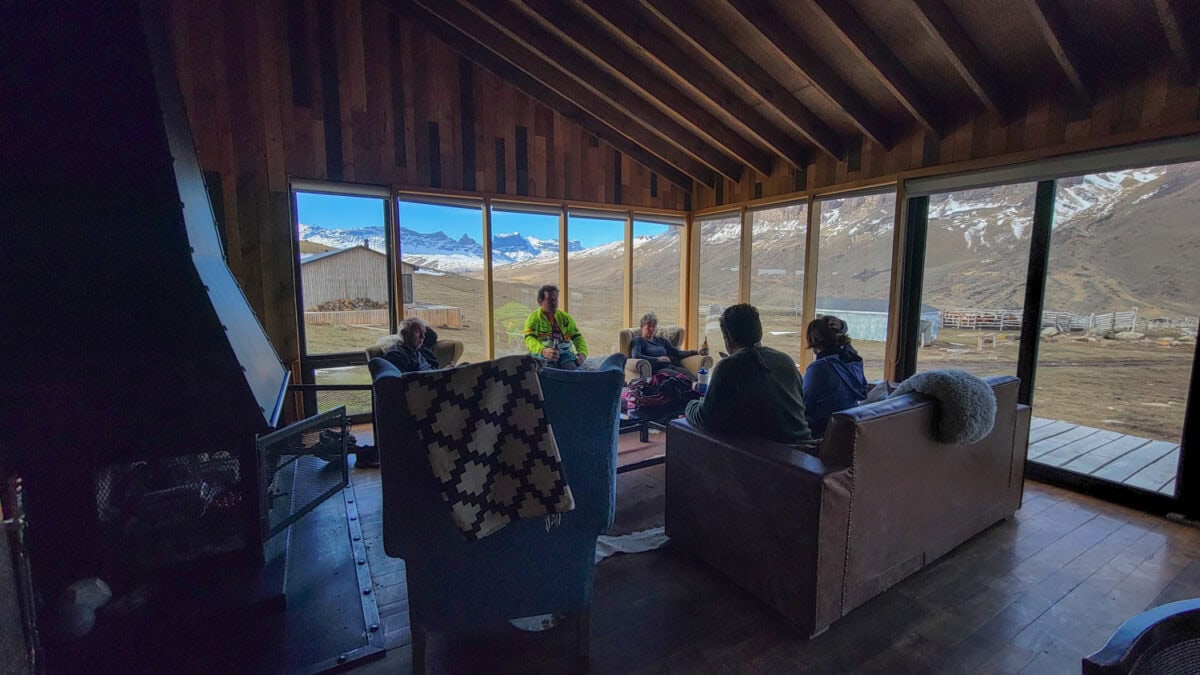



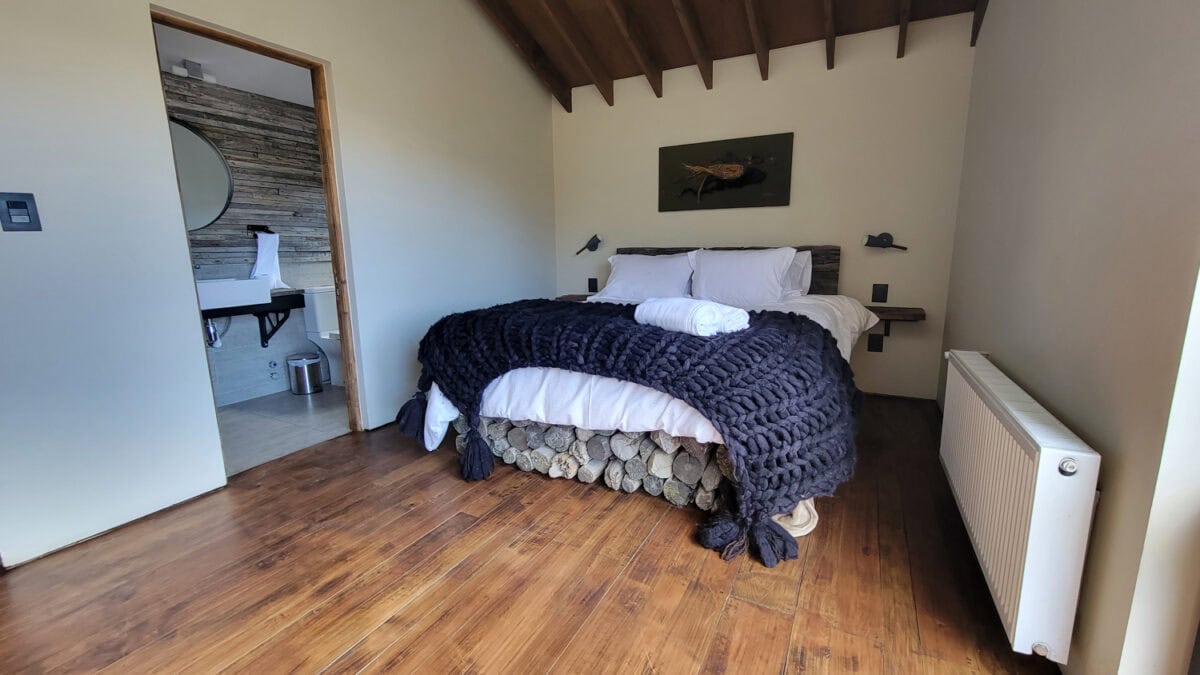



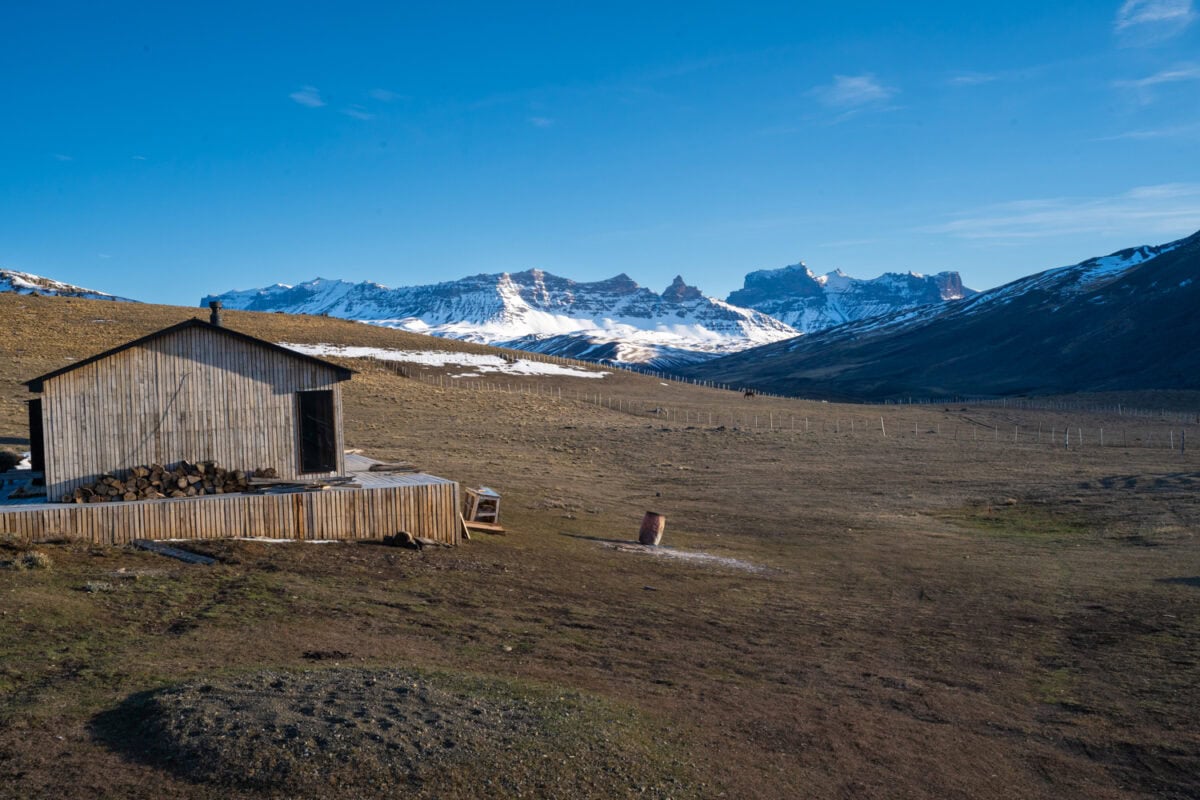



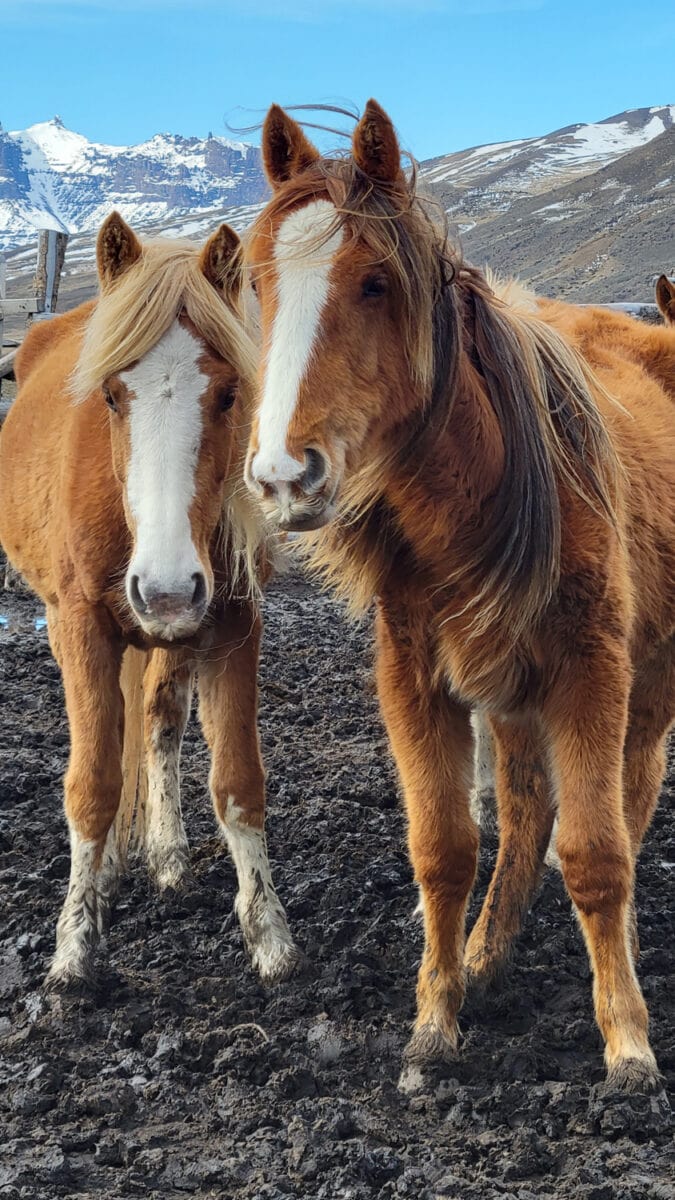



She built the extra ‘cabin’ we stayed in for tourists/visitors because she wants to welcome horse riders from all over the world to this unique place. “Here you have thousands of hectors and you are free to do what you’d like,” she proudly explained. They have 160 horses – most of them wild (bagual) – they ‘live’ on the property. Some are tame. About 24 can be ridden, but you need to be an expert rider.
The ‘cabin’ was filled with windows and a beautiful shared area where we ate and relaxed around the fire.
In addition, star gazing was incredible in this remote location with zero light pollution. It was hard to leave 3R the following day!
Wildlife Viewing
One of the most surprising things about this trip was the amount of wildlife we were treated to.
Herds of wild horses ran across our path, and curious guanacos stopped grazing to look at us inquisitively. This alone was incredible to take in as we biked along the gravel roads, but the mountain backdrop made it even more spectacular.
We saw herds of horses, guanacos, rheas (birds that look like ostriches), sheep, foxes, flamingos, and many condors. While used to seeing people on horseback or in cars, most of these animals had never seen bikes before. They would stop and stare inquisitively, some would run alongside us, and the condors would circle above us, enjoying gliding on the winds.
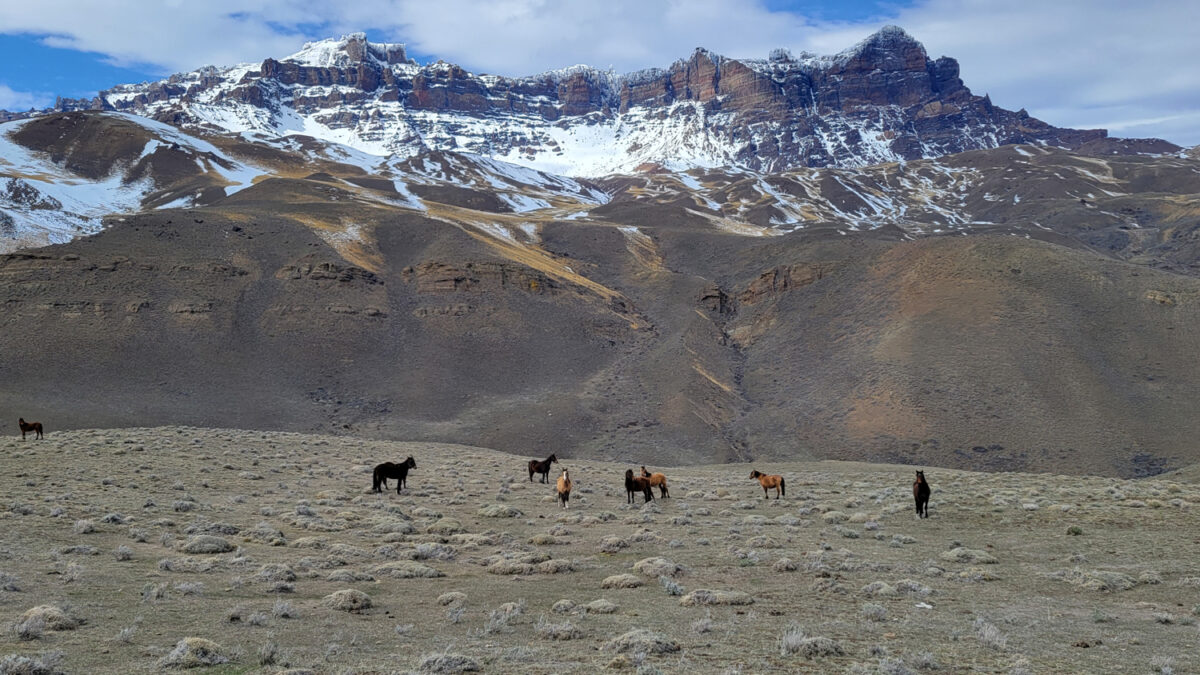



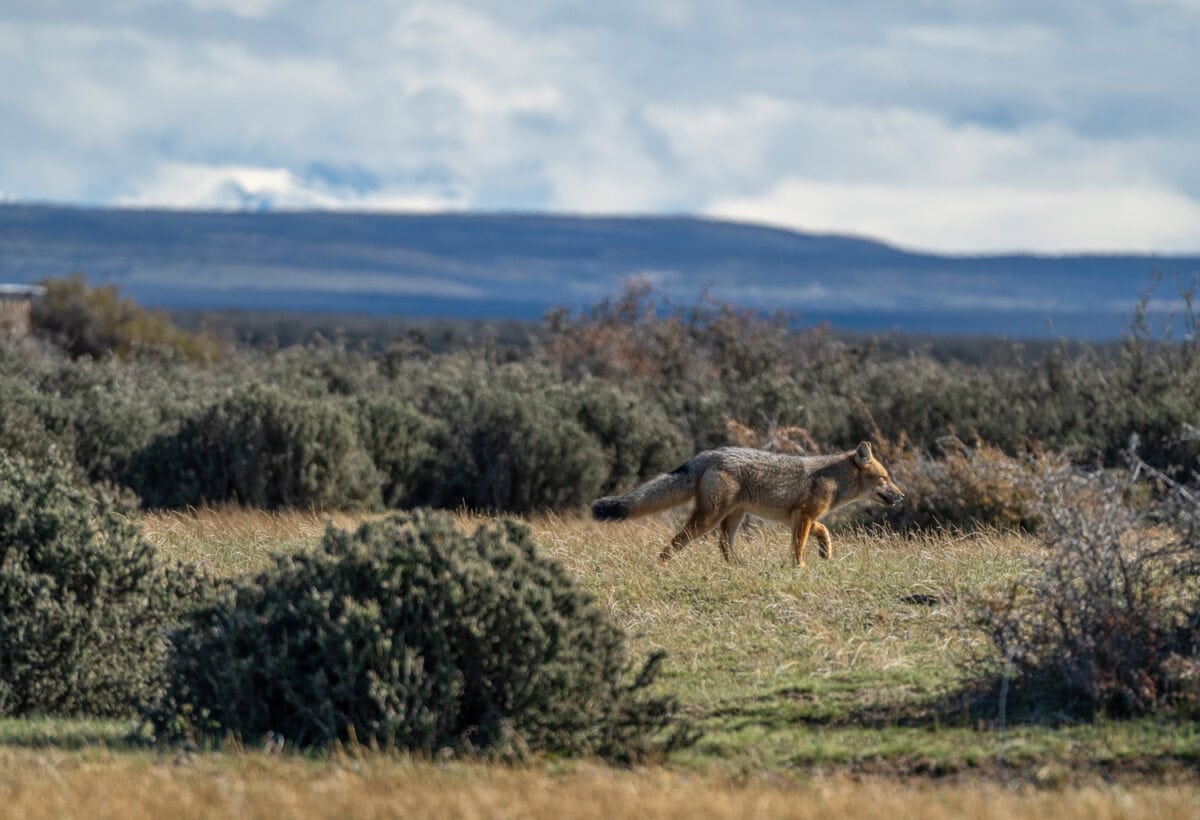



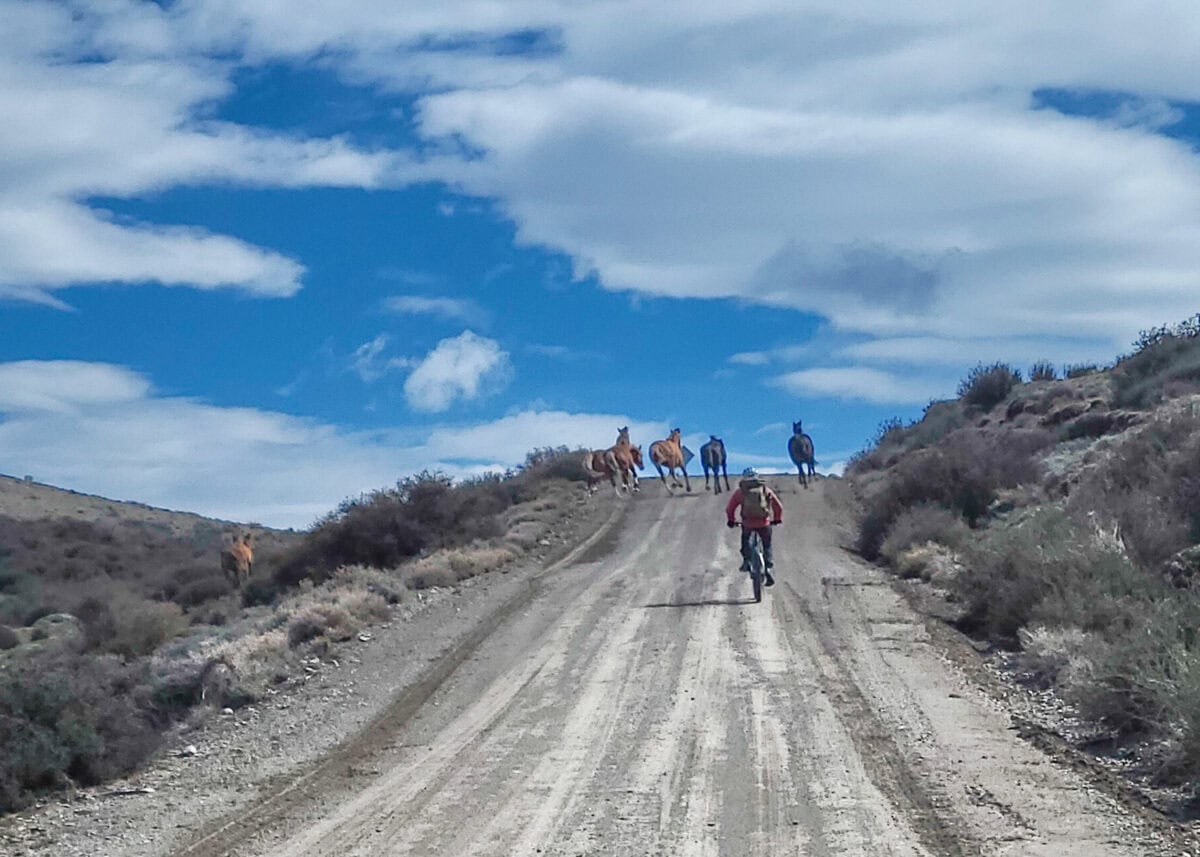



My favorite experience was the herds of horses. They would run alongside us for a while, stop as a group, stare at us, and then take off running again! It felt like a Patagonian safari! There’s nothing quite as beautiful as seeing wild horses race around.
A Different Perspective of Torres Del Paine Through Patagonia Bagual
In addition to the horses along our route, we stayed at Patagonia Bagual as part of our tour. Here, we took a break from biking and got a mix of science and tourism by hiking in a privileged park sector behind Sierra Masle in search of the herd of wild horses that ‘live’ in Torres del Paine National Park.
Victor Moraga has been tracking and studying the wild horses and other hard-to-find wildlife in this northeastern part of the park for years. He gained special approval to run hikes here a few years ago, allowing visitors to see the baguales and showing the government and local farmers that they are worth protecting as they bring valuable tourist dollars to the region.
We hiked for 10 miles in search of a herd of 120 wild horses. Sadly, we didn’t see them as they were in another region of the park that day, but Victor taught us so much about the horses, other wildlife, gauchos, and the park! Plus, we hiked to some rare views of the torres that only a handful of people can see.
One of my favorite parts of the experience was how we entered the park.
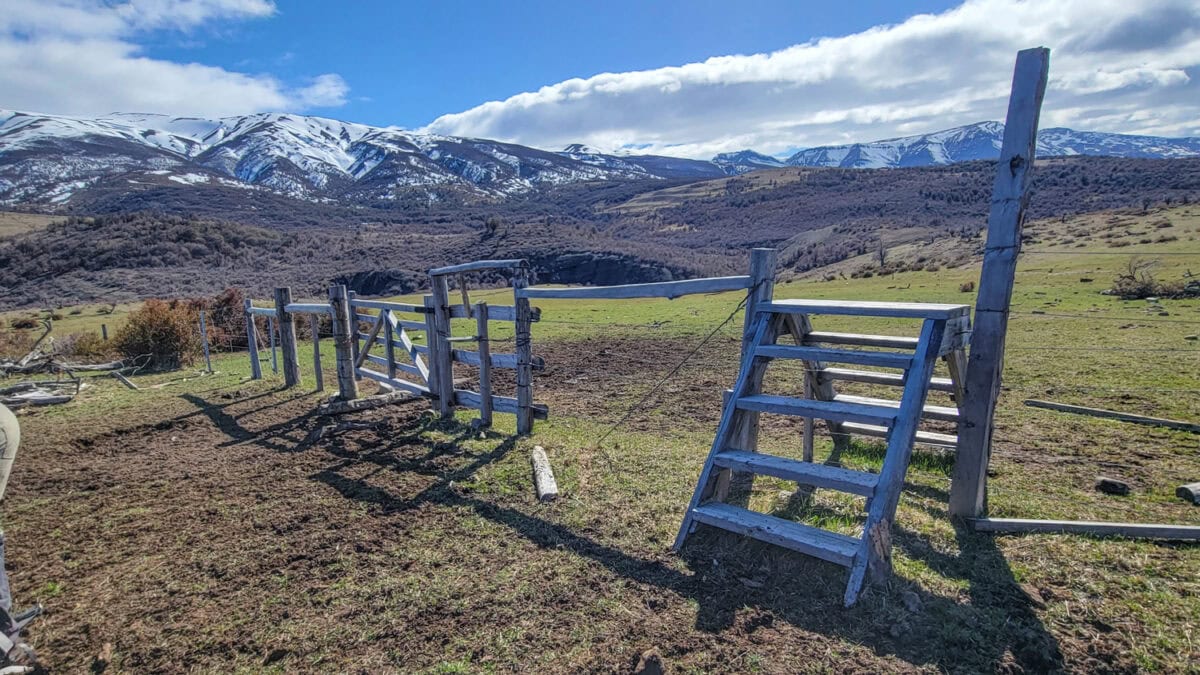



Would you believe this little stile (stairs that permit humans but not animals to cross a fence) is one of the entrances to Torres Del Paine National Park? Only a few people ever enter the park this way with the guidance of Patagonia Bagual.
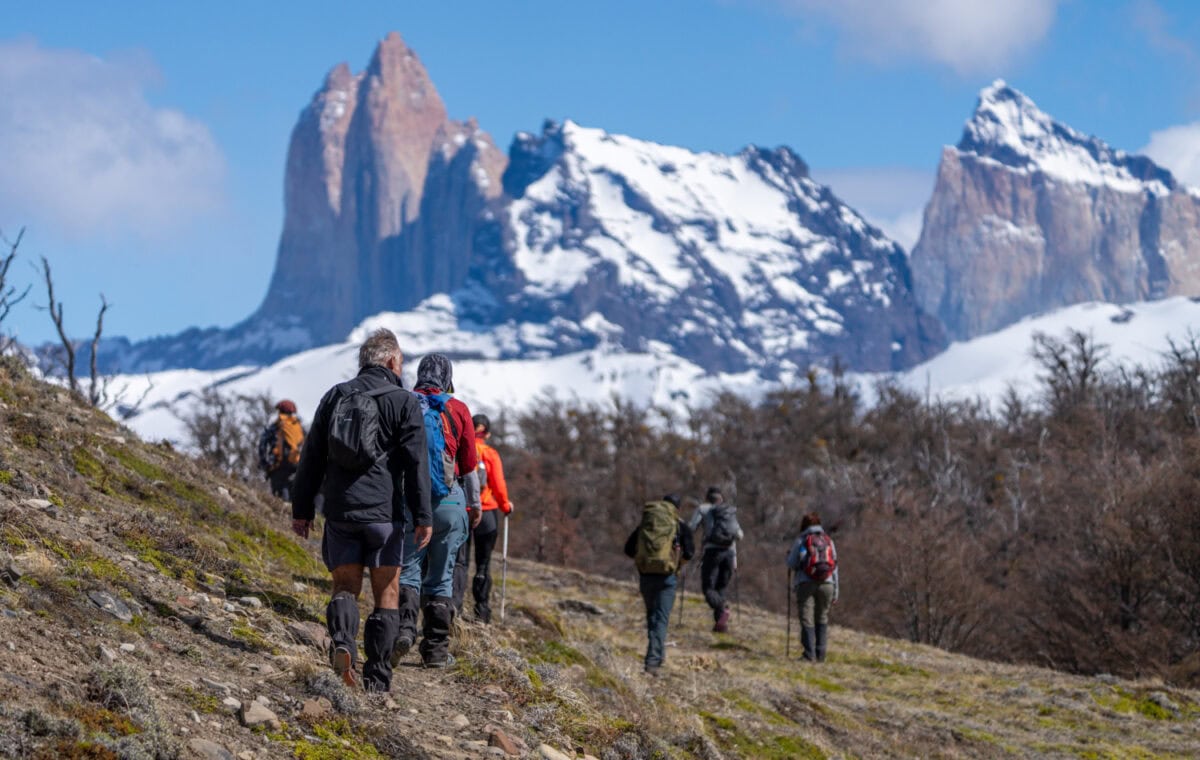



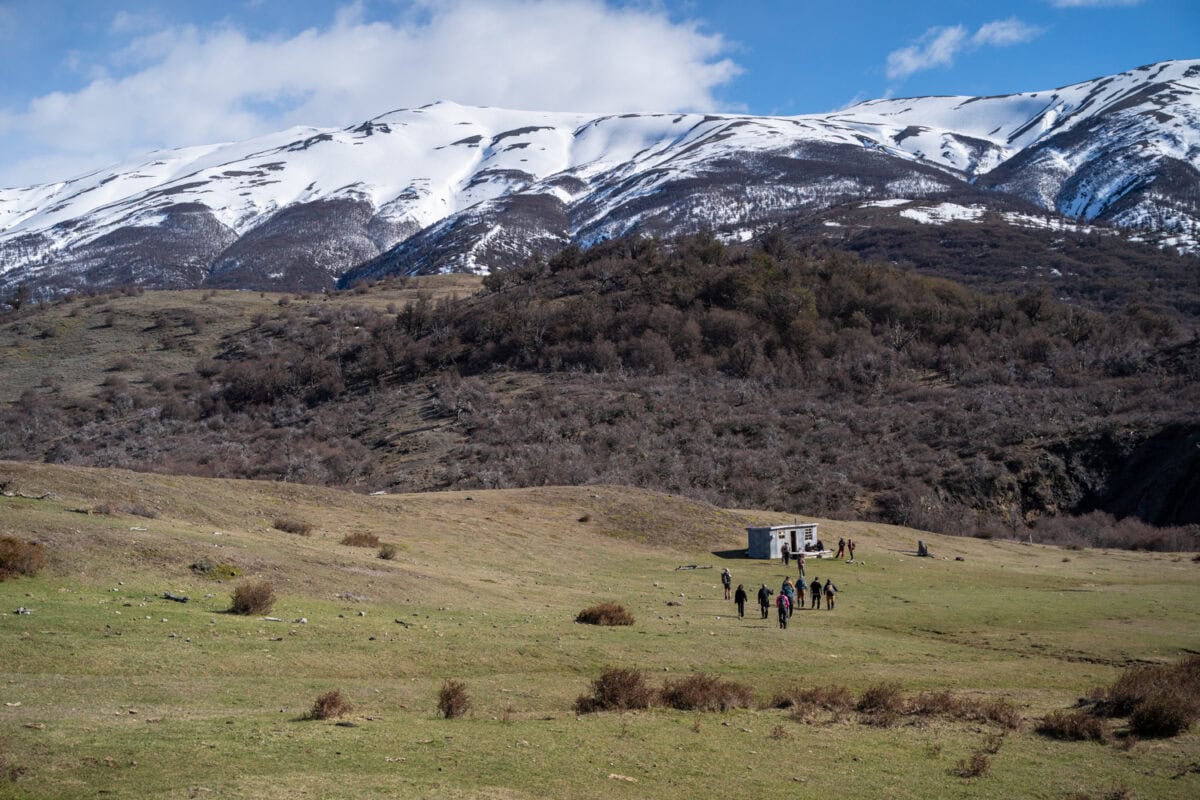



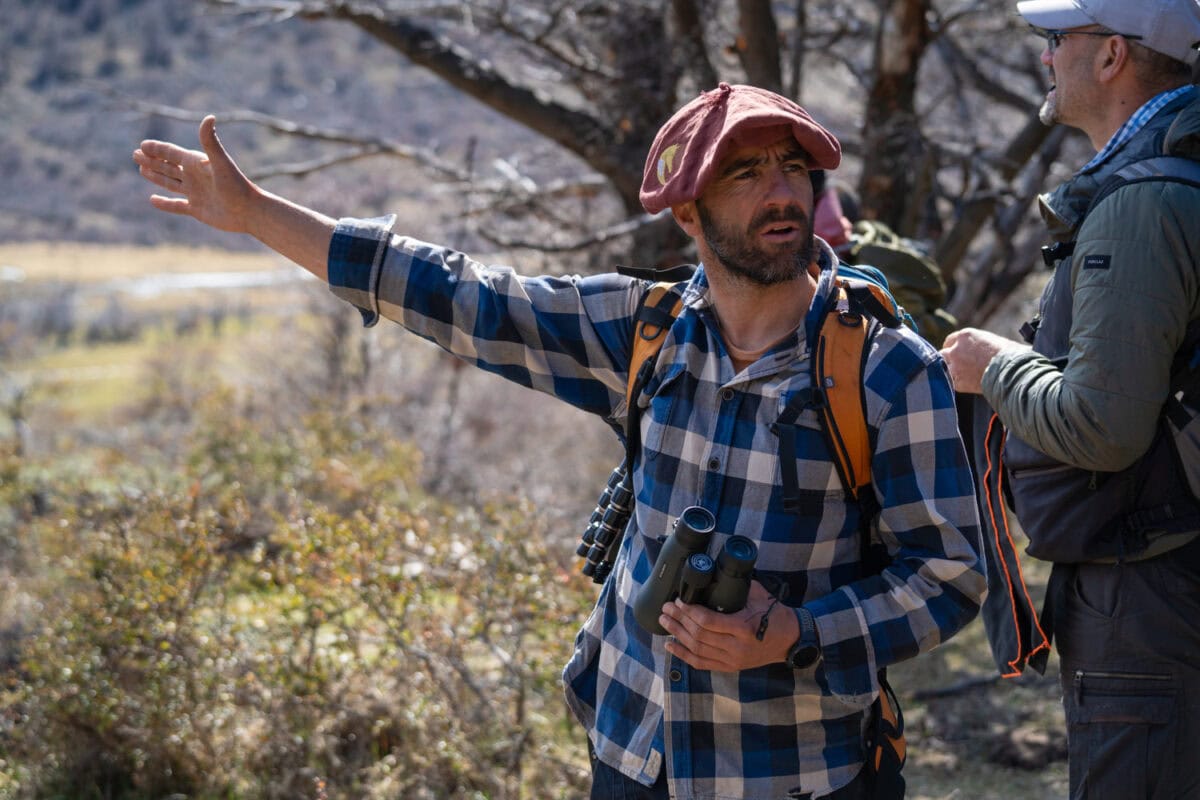



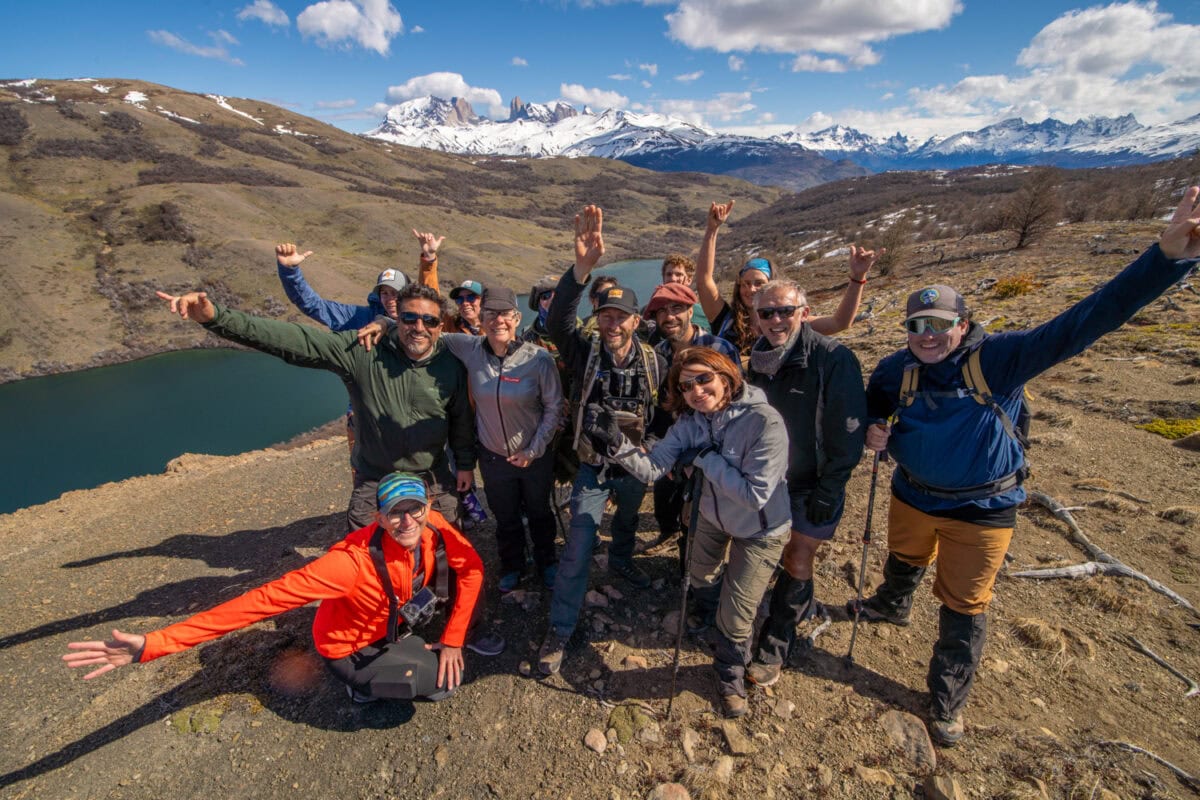



Culture Through Food
One of the other highlights of the trip was the incredible food that awaited each day as we finished our ride at an estancia. The feeling of biking all day and then pulling up to a warm shower and a feast of appetizers and beer was pure decadence in a rustic setting. We earned this!
Our private chef, Rodrigo, was so focused on providing us with the most amazing food after our active days that it was thrilling for me (a bit of a foodie) to watch him. Each night, he would cook up a feast over an open-flame fire, and I would sit there in awe, watching him at his craft. Seeing someone cook in this traditional Chilean way was better than any cooking show!
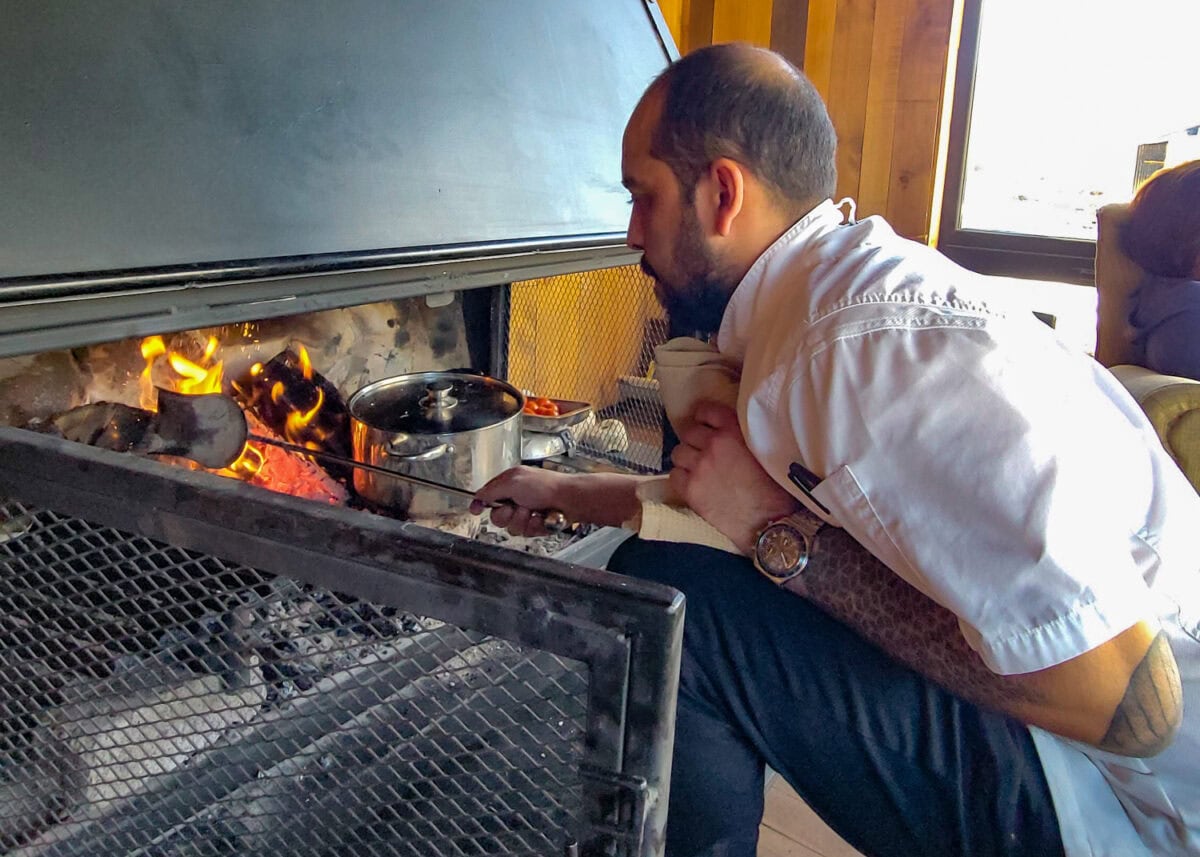



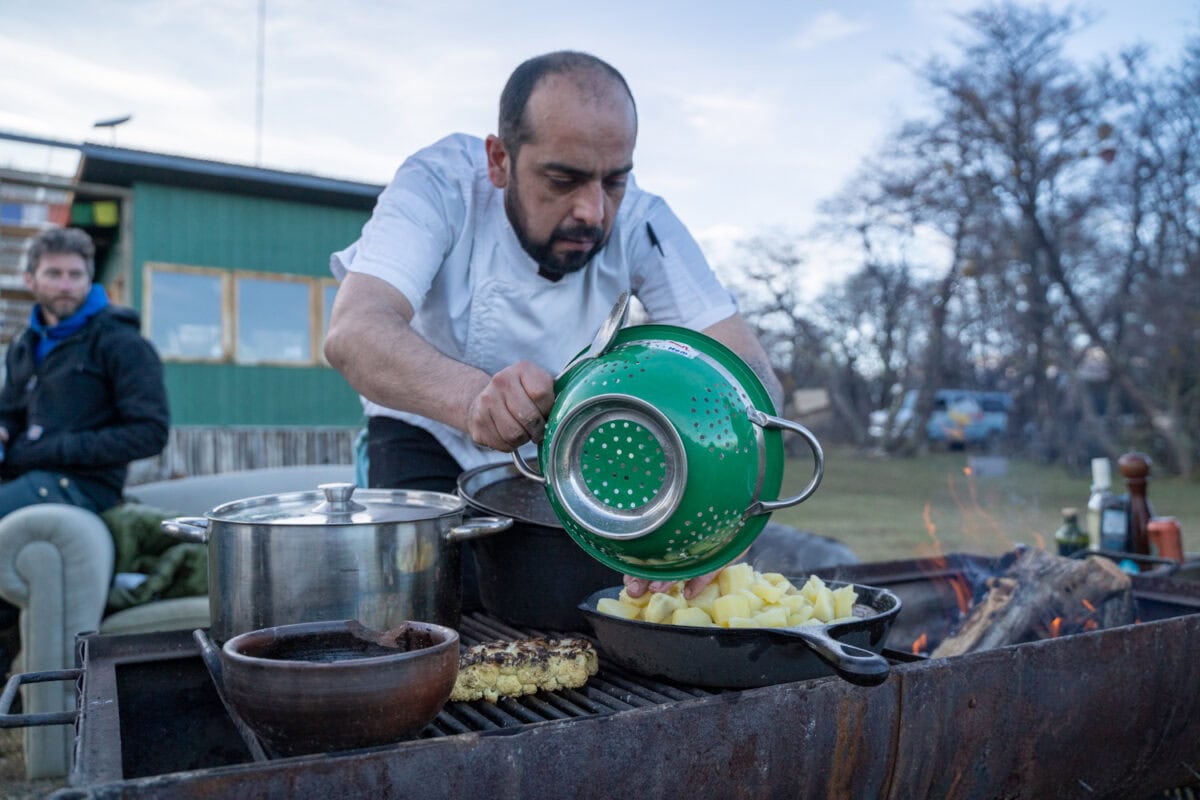



On the last night back in Puerto Natales, Chef Rodrigo treated us to a meat extravaganza at Chile Nativo’s quincho. Wine flowed, we ate meat with our hands, and we reminisced about all of our incredible experiences over the last week. In true Chilean style, we never even sat down—we just all gathered around Chef Rodigo and the grill as he passed around hot plates of perfectly grilled meat and sides.
Local Support Staff
Everything went so smoothly during our trip; we were lucky with the weather and water crossings. There was only once where we had to ferry the bikes over a strong flowing river. But it was so nice to know that we always had a support vehicle in this remote area.
It was nearly the only car we saw on our trip until the last day when we biked into the park and were reacquainted with the other tourists!
Our knowledgeable guides, who took care of us and our bikes the entire trip, were the final piece in making this the perfect trip.
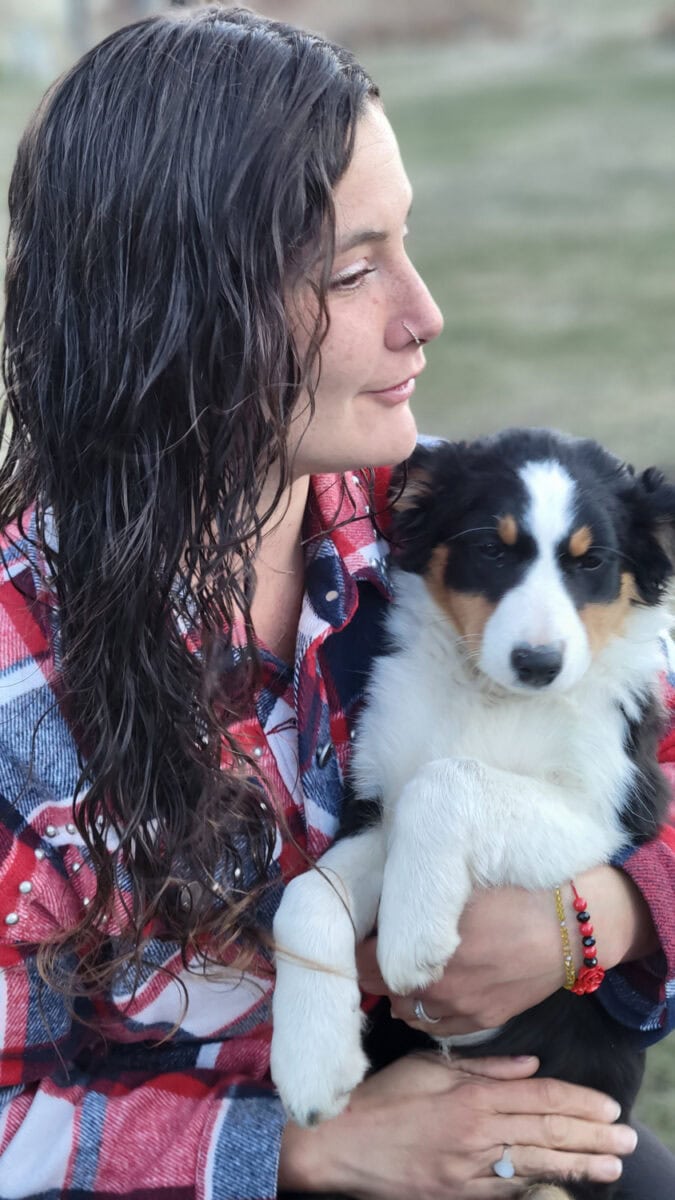



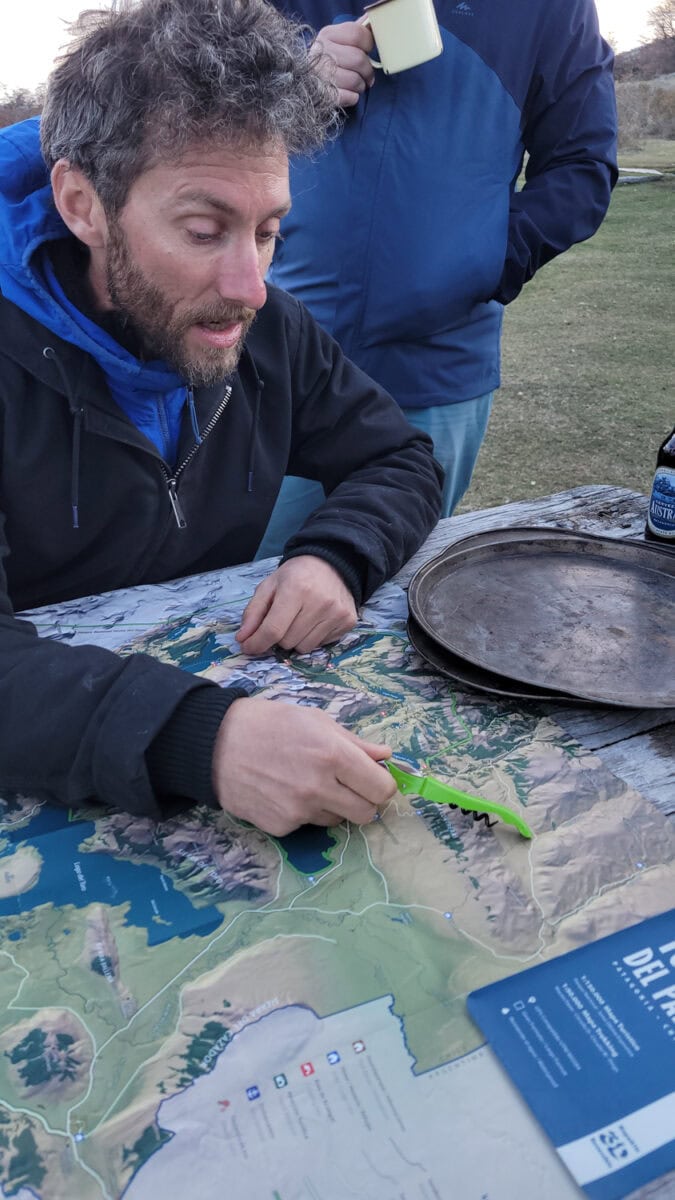



The eBiking and Estancias tour is a unique way to experience the Torres del Paine Patagonia region.
While on a bike, I watched the remote landscapes go by, like generations of gauchos before me. As herds of guanacos bounded across the road ahead of us, leaving us in awe, I couldn’t help but be overcome by feeling like a part of the remote expanse of nature surrounding me.
How you can take This Unique Trip to Torres Del Paine
Ottsworld Tours
I loved this trip so much that I’ve started offering it as an Ottsworld Tour. I’ve customized a few pieces of it and will offer it as a small group tour for nine people from March 15 – 21, 2025. See the complete itinerary and learn more.
If you cannot make these dates and are still interested in doing this tour – Chile Nativo offers it (a slightly different itinerary) at various times in the season. Learn more here. Use code Ottsworld for 5% off ANY of their regular, non-custom programs (including hiking and puma tracking).
Chile Nativo
Gonzalo started Chile Nativo as a horseback riding company. He is passionate about creating new tours that connect with the community. To entice people away from the W trek and to other parts of the surrounding areas, he came up with the eBike and Estancias trip. He basically took his existing horse-riding tours and turned them into biking tours with a few tweaks!
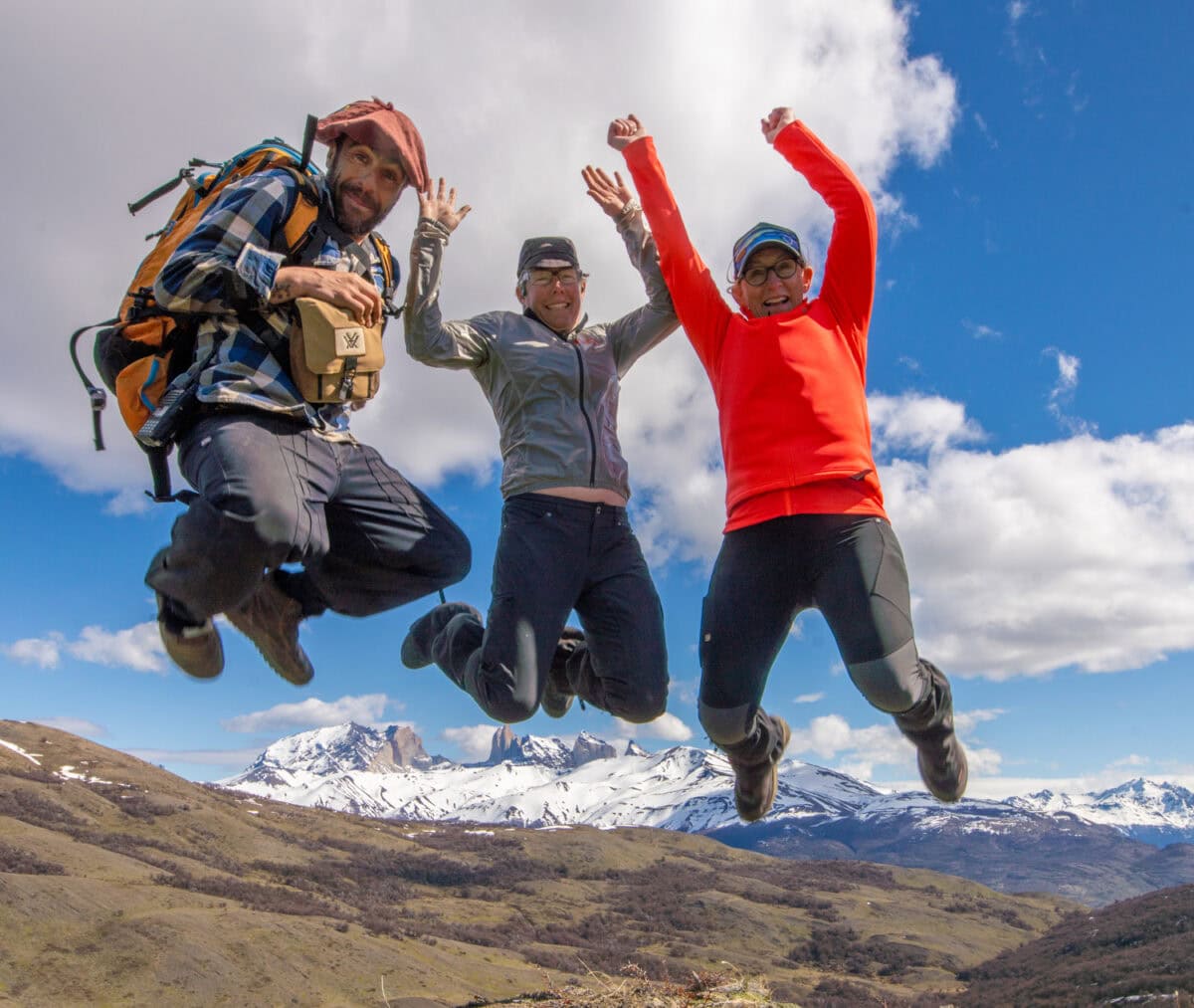



Frequently Asked Questions
Can you bike in Torres del Paine?
Yes, however, I highly recommend an e-bike. The winds in Torres del Paine are notorious and would make normal cycling nearly impossible for the average person. The roads in and around the park are primarily gravel – so a bike with mountain bike knobby tires is also recommended.
When is the best time to cycle in Torres Del Paine?
Fall in Patagonia is sometime between February to April. You get less rain, less wind, and still relatively plenty of daylight hours. And, of course, fewer people, too.
Do you need to be an experienced cyclist to do this biking trip?
No, but you do need to be comfortable on a bike. This means that you should be riding a bike regularly to prepare for this trip. It is not necessary to be an expert biker to participate, but you should feel comfortable for 6 to 8 hours a day of activity in any kind of weather. On our tour, we had a person who was relatively new to cycling and had never ridden an ebike before. Thanks to the ebike, she made it the entire way and did great navigating the gravel roads and hills.
Can you hike and bike in Torres del Paine Park?
Yes – you can organize both!
Check out Chile Nativo’s offerings here, which include hiking and biking, and get the best of both worlds! They even have a fast-track W route. Use code Ottsworld for 5% off ANY of their regular, non-custom programs (including hiking, biking, and puma tracking).
What are the alternatives to the W Trek?
One of the best alternatives to the W trek is biking around Torres Del Paine. But beyond biking, you can also do multi-day kayaking trips, puma tracking, wild horse tracking (see Patagonia Baguales above), multi-day horseback riding trips, fishing, and there are plenty of other hikes to vistas around the park.
What is an Ebike?
An eBike, short for electric bike, is a bicycle equipped with an electric motor that provides propulsion. These bikes often look like traditional bicycles but feature a battery-powered motor that assists the rider’s pedaling efforts. eBikes come in various styles, including mountain bikes, road bikes, commuter bikes, and even cargo bikes. The electric motor can be activated through pedaling or by using a throttle, depending on the type of eBike. They offer riders the ability to travel further distances, tackle hills more easily, and reduce the effort required for cycling, making them a popular choice for commuting, recreational riding, and transportation.
Related
Disclosure:
I was a guest of Chile Nativo on this inagural Ebike and Estancias trip. However all opinions expressed here are my own.

